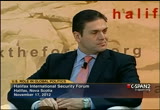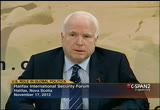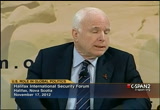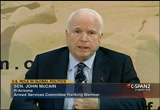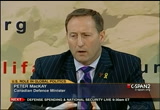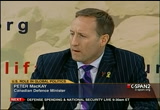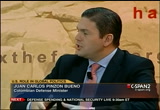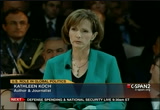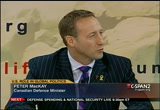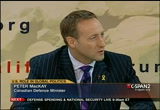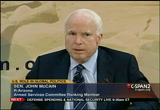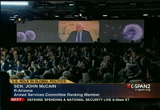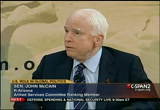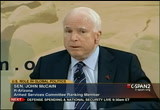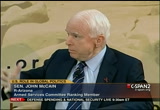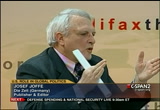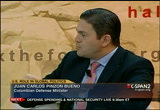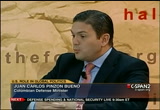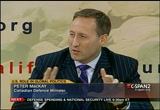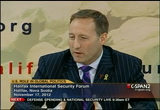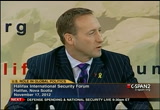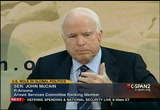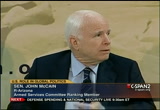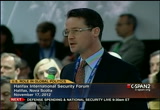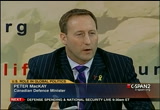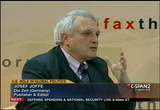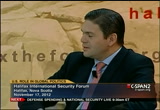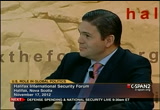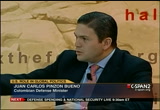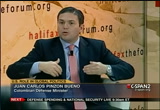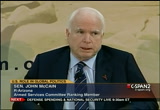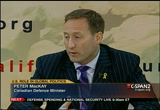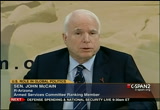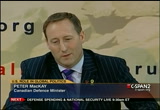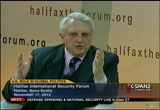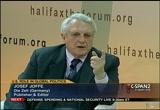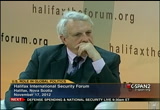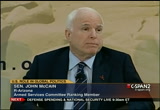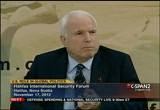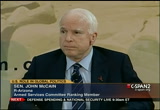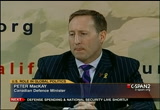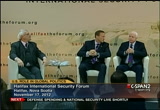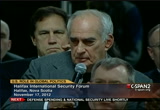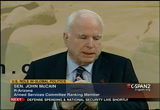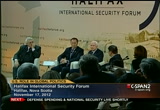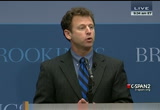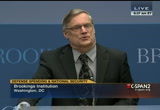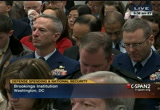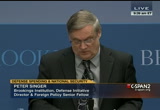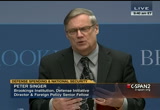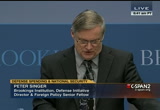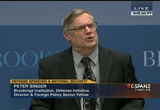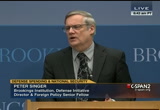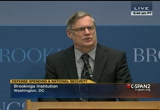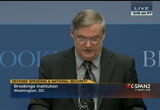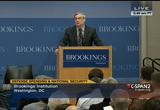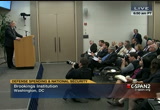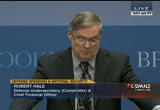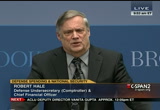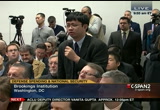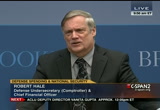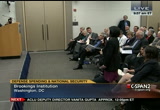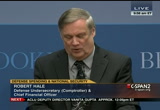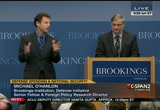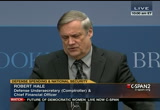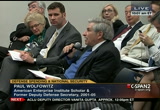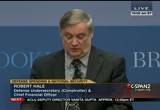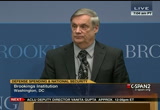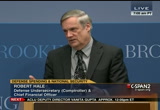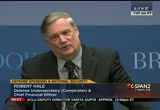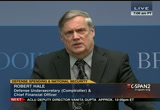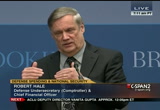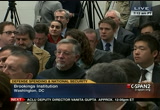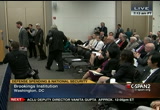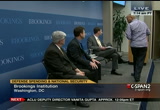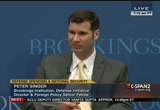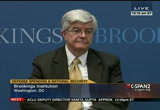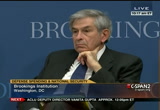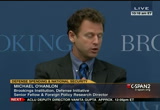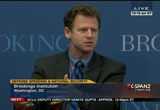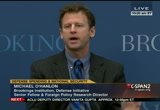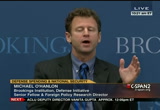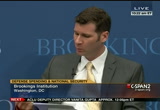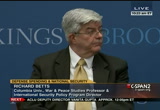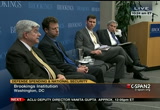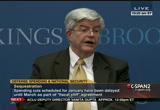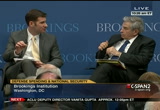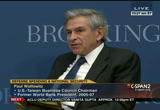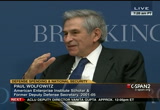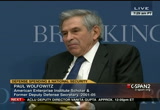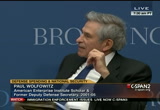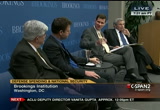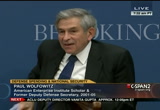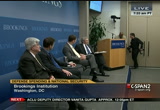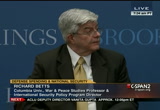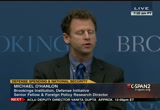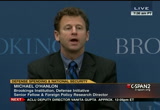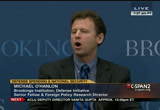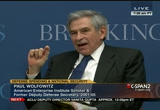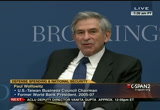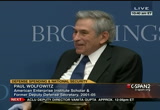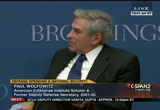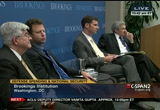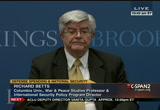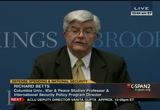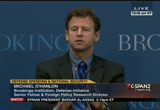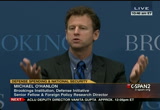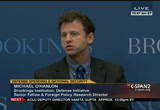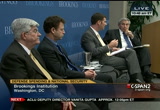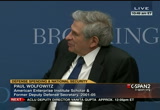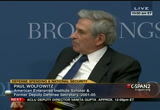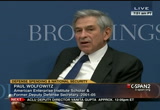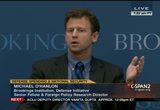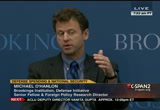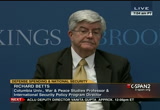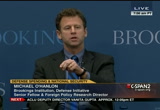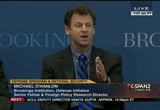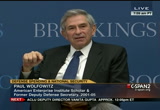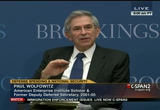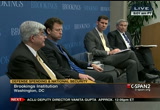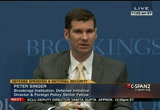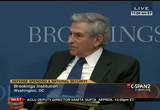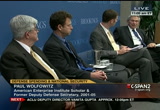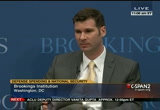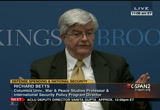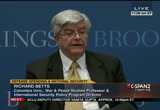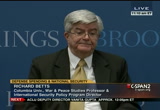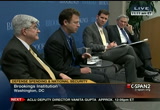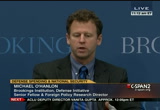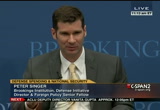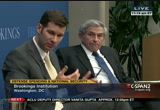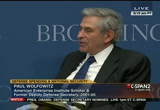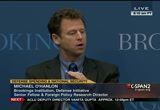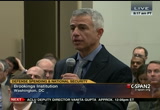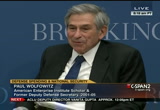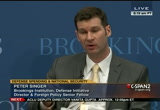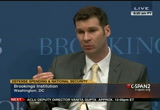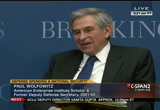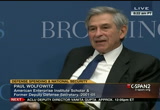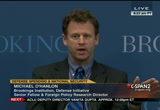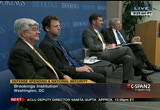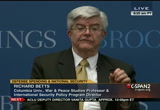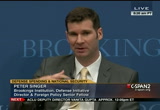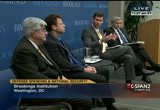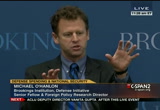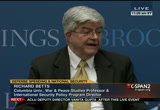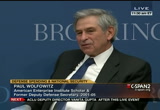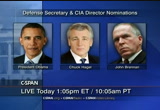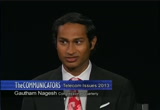tv U.S. Senate CSPAN January 7, 2013 8:30am-12:00pm EST
8:30 am
in countries like iraq, like afghanistan. and we ask ourselves were we the good guys? did we get it right? did we do the right thing, or did we do more harm than good? in our questioning, though, i would like us not to look back, not to rehash the past, but let's, if we can, look forward and really reflect on the lessons learned in these interventions and see how they can inform the actions of our community of democracies as we move forward into the future. first, again, we have a panel of luminaries that virtually need no introduction, but i will briefly introduce them nonetheless. first, juan carlos pinson, minister of national defense for colombia, welcome. senator john mccain of arizona, someone who i personally have had the honor to interview back in washington since he was a congressman from
8:31 am
the early '80s. welcome, senator. and our wonderful host, pete mackay. and finally, josef joffe. senator, i would like to start with you. the first panel yesterday was looking at this question of a new normal, and the united states' current light footprint strategy. i could literally feel you chomping at the bit as one of the panelists discussed what he saw as the u.s. role in the world being in such a state of flux now. but we are less willing than ever before to step up to try to solve the chaos in the world, especially when there's no pressing national interest. >> first of all, i think we have to as politicians understand what our constituents, what our citizens, what their priorities are and what their concerns are. our former chairman of the joint chiefs of staff made a comment that's been b often quoted, he
8:32 am
said our greatest national security threat is our economy. and i think that that is absolutely true. when we have half the homes in my state of arizona still underwater, worth less than the mortgages that they're paying, people, obviously, their attention is on that aspect of their lives. and so when we talk about foreign adventures, they're very reluctant particularly with our iraq and afghanistan experiences, they are extremely reluctant. it calls for leadership, it calls for leaders to inform people why it's important what's happening in the arab world, why the rise of radical islam extremism over time poses a threat to us, why china in their sometimes-immature behavior can pose a threat over time to stability in the asia pacific region. so it's up, it's up to us to try
8:33 am
to explain to our citizens and our constituents why it is that we have to do a lot of things. foreign aid, that's the favorite target. i just want to mention one thing. there has always been an element particularly in the republican party, there's always been a conflict. it's between the isolationists and those who believe that were, have a role to play in the world. you could trace it back to after world war i when we rejected united states membership in the league of nations. the prior to world war ii isolationists, lindbergh, ford, all of those. the post-world war ii, and we are seeing that coming back strongly in my party today. >> how much does that concern you, sir? >> concerns me a great deal. we had a vote in the senate by the senator from kentucky just before we went out to cut off aid to pakistan, libya and
8:34 am
egypt. it only got ten votes, but now that's spread all around the far right, uh-oh, they should have voted to cut off that aid. and so we are seeing that emerge in our party and in our or nation, and a lot of people say why should we be spending money on these foreign adventures and foreign assistance when we have so much trouble at home? and that debate will rage now between now and the next elections and, particularly, the next presidential elections. >> minister mackay, your nation has been such a loyal ally to the united states, following us into afghanistan. your country was involved to a lesser extent, certainly, in iraq. but considering the outcome in these two places, how would you say your nation's point of view has changed, if it has, on the
8:35 am
responsibilities of we democracies to take actions like that? >> well, i'll come directly to that, but i want to play off something that senator mccain said. that in considering interventions, military contributions, foreign aid, there's no question that the very stormy economic situation that we've all come through, the pa jillty of the economy -- fragility of the economy still directly influences a government's thought process. it certainly is a determining factor as to what and if a country will contribute to an intervention. >> cutbacks to the british -- >> 25%. i mean, they're tying up ships, there's soldiers in the field getting notices that there won't be a job for them when they return from service overseas. so my father had an expression i thought that was very apt. he said when water in the drinking hole starts to go down, the animals look at each other differently. [laughter]
8:36 am
and -- >> what does that mean as we go forward? >> the water table is low. >> [inaudible] >> so canada joined the united states and others, our allies, in the decision to go to afghanistan. we had a security council resolution. there was a clear indication that had we not, afghanistan would remain an incubator and an exporter of terrorism. so, you know, to answer directly was it the right decision to go, yes. afghanistan certainly no longer poses that threat to the world, and minister wardak who's joining us here i know will have some very insightful comments. but the reality is to bring it into the topic of panel, there is a higher calling, in my view, and an obligation on democracies, on countries that see themselves as, yes, accountable to their
8:37 am
populations -- >> no matter the cost? >> but accountable to the broader world. and we can't sit in splendid isolationing in north america or anywhere else and think the world won't come to our door. it did on 9/11. so not at any cost, not without very informed decision making. often instructed by the security council and other bodies, other consultations, nato being very high on that list. and, you know, what i suspect we'll get to in this panel is syria. what's happening in israel as we gather here this weekend. and so these are the questions of our time. these are the challenges of our generation. and that's, i think, one of the great benefits of opportunities like halifax, to have a very in-depth discussion about how we
8:38 am
act as a community; a community of democracies, a community of countries that care, that are compassionate and that are able to do something to stop the slaughter of innocent civilians. >> of the many who say that we need to as we have more young, emerging democracies like your own that they need to be stepping up to the plate and taking more of the responsibilities. so we're talking indonesia, india, brazil, turkey, south africa. but at the same time, i also hear the statement made and as they get involved increasingly and should step up to the plate and helping to nurture democracy protect human rights, that those countries also have to be careful to make sure their own house is in order in that respect, that those in glass houses can't throw stones. what are your thoughts on that? >> well, i think certainly more nations now have a role to play, and definitely in our case we're trying to play that role based
8:39 am
on our experience. as you maybe might know, most of you, our country just 10, 20 years ago was mentioned always by terrible case of violence, terrible case of terrorism, drug trafficking. that was the main story in our case. i think one important message that i believe for this panel is that certainly democracy is very important. but it is very important when it is the people that really wants to save their own nation and want to play everything around. i think that's a little bit what happened in colombia. in our case certainly very strong, important leadership vision from many of our leaders, but at the same time a national will to recover the country, to find a road, i think, has been critical. and by having that, then you
8:40 am
find international support and cooperation. and i think the case of colombia becomes an interesting case of how international support, but following behind national leadership, can become a proxy that can provide some important results. at the end what we are getting right now is strong institutions, and those institutions are the ones that are luing us to think -- are allowing us to think about a better future, a better democracy. currently, what is going on in our case is that still we have very big challenges, and we know that. but we need to keep doing what we're doing, keep moving forward. and more importantly, we have learned that with a very humble attitude we can offer other nations what we learn, our
8:41 am
experience. and this is what we're trying to do now, to be very humble and at the same time to tell which is what we did, this is what we learn. if you think it is useful, come with us. we can give you these ideas. >> thank you. mr. joffe, as we look at the current economic situation globally today in the united states, obviously, in europe and around the world and we talk about trying to nurture and support democracies and protect human rights, does -- as both the senator and the minister mentioned earlier, does the question morph into, you know, not so much what are what we want to do and what our responsibilities are, but what we can do, what we can afford to do in these days and times? >> well, you're right that we shouldn't dwell too much on the past, but the past of humanitarian intervention or nonintervention teaches us something about the future.
8:42 am
there are five cases. there's -- [inaudible] , there's darfur -- [inaudible] , there's libya and there's now syria. we only intervened in one of them, libya. because when we bombed serbia, that was four years after -- [inaudible] and then if you look at that lineup, some very nasty questions appear when we talk about -- [inaudible] and there are so many of them that had to write them down. first, what moral duty, what moral duty demands how much sacrifice? second, will i have to commit more bloodshed than the bloodshed i want to prevent? three, do i have the capabilities? that's what we're talking about here. what are my chances of success? , four. five, how sustainable is my mission? how much stamina do i have, and that's very relevant if you look at iraq and afghanistan. six is an end to this
8:43 am
intervention. do i have an exit strategy? and seven and finally, what will happen when i leave? will the killing resume? must i come back? now, if you look at it this way and you apply that roster to the five cases, you understand why we intervene in only one case. it was quick, didn't take any sacrifice on our part, we fought from the air. thank god we've got the ammunition from the united states. there was some strategic interest in the part of the europeans. it was coo close to home -- too close to home. and we didn't go on the ground, and we didn't stay. so in other words, and that's where i end, there are some harsh limiting conditions to humanitarian -- [inaudible] and the moral obligation is just one part of the calculus. >> mr. mackay. >> well, i hi it's a very interesting point about the obligation, the burden that we're talking about, and not all
8:44 am
democrats are created equally. not all democracies came about in the same way, the same form or fashion. so one of the subjects around the nato tables annually is burden sharing. um, this leads into this question of what can you contribute? you can contribute something, and can when the decision is made to make an intervention -- which is a very, very difficult one and has, you're absolutely right to suggest there are long-term implications -- you certainly don't want to leave things worse than you found them. and this is, of course, much of the consternation and the stress, i suspect, of people in afghanistan feeling post-2014. what is going to be left behind? will the peace and stability hold? what about the ongoing development projects that are in that country? and that has been true going
8:45 am
back to second world war and beyond. so put it into the context of syria. who can make the most meaningful contributions now? and the contribution doesn't have to be military. russia, i would suggest, should be called upon to step up and belly up to the u.n. security council and exert influence. they, i suggest, are the most influential at this time. and have the ability, number one, to stop supporting this regime that is slaughtering its citizens, to stop by its acquiescence standing on the sidelines and letting it happen while the rest of the world wrings its hands and sucks its teeth. >> how do we accomplish that? >> well, pause i think they can -- because i think they can exert influence in the capital
8:46 am
of syria. i think they're oneover the few countries that really can at this point. iran? forget about it. >> i asked how, how do we get them? >> well, because they could support security council resolutions which thus far we have not been able to achieve because of the reticence of china and russia. >> let's discuss the responsibility. >> go ahead. >> what is the rationale for doing so or not doing so? i think it's got to be based on one principle. ..
8:47 am
how could we have intervened effectively in rwanda? so the strong caveat to that is that we can't right every wrong. we can put at every fire. we can't intervene, even though there's a compelling humanitarian interest, but where we can we should. because it is in our interest to see countries develop, to have a chance for democracy and freedom, and they are things that we've all stood for, certainly in our country, for well over 200 years. so the decision has to be made by policymakers where our interests and our values, but also where it's possible, but also you have to have the support of the american people.
8:48 am
otherwise like the vietnam war, you leave in disarray because the american people lost confidence in their government and in the nation they were on. i still, as good as relations we have with vietnam now, we still condemned a few million people to refugee camps, i mean to the education camps and execution and all of those things. so i think the discussion that has to be made between leaders and their constituents is that if we see something that we can rectify, we should. but we have to understand the limitations of those interventions, because you are far worse off if you fail if you have never gone there to start with. this brings us to syria. i'm ashamed. i'm ashamed. i'm ashamed as an american. i've been to refugee camps and met the women have been gang
8:49 am
raped. i've met the families have watched their kids shot before their eyes. i've met the defectors who said their instructions are to go around and kill and rape and torture. and while we sit by and watch that happen, without even giving them weapons to defend themselves, this will be a shameful chapter in american history, my friends, because we could've done something. and we can do something today but we won't. i hear that the new president has been reelected, we will be re-examining all. only 37,000 people have been massacred, i guess in the grand scheme of things that's not too many compared to some wars, but we could've done something about it, and we can still do something about it, and we can do it collectively and to allow come in all due respect, peter, because russia vetoes the resolution and the security council is the reason for not doing so, to me it was not sufficient reason to not to act.
8:50 am
>> our values are interesting but i'm not sure it's always the case. our interests, the interest was in the case of iraq to maintain that bastion of power against -- [inaudible] then we intervened against the bad guy which required our values, and what we ended up was liberating the power of iran and making iran that much stronger, which is giving us -- let me finish. speed let me say quickly. the perception at the time, the greater threat was the weapons of mass destruction. that was a greater threat, whether right or wrong, we believed that's what the threat from iran was. >> but i'm saying that's one of the outcomes. maybe we could have predicted the outcome. it's a sad outcome where our interest and our values were not
8:51 am
the same. now, we get to syria. the problem with these countries is that there's a civil war there. and in a civil war you don't necessarily do by the bad guys and good guys. so we give weapons to one party, which then makes it and subjugates the other and there's -- the alawites, the kurds, the christians, the few jews who are left. so that is what bothers me so much. in a way we have to be there and stay there, and then protect our former enemies against our former friends who are now beginning to slaughter these guys. so that's why the point is very simple. if you go in you have to be ready to stay and protect those whom you have, when you help the others, we have to protect them. i think we can't just go in and
8:52 am
leave. >> i'd like to bring in -- >> i come from a place where you have a different perspective. listening to this kind of wonderful, to see how, you know, larger nations can think about, but i would, you know, comment on the following. i think certainly when you see human rights violations, when you see the cases senator mccain has described, i understand the moral obligation to step in and find a way to solve things. but i think we are in an era of not intervention but cooperati cooperation. i think, i believe our case could be one to look around. because when you intervene, my impression is that sooner or later you will harm the people
8:53 am
you're trying to support. just by the idea of someone from the outside is trying to solve problems or to take over your own responsibilities. but when you think that you can support a system that is really willing to make things happen, respecting culture, respecting realities, understanding what is behind, i think the potential of that cooperation, that support could bring something more lasting, if i can use the word. so i think it's not a matter of defending, protecting human rights, protecting people, protecting the right values of democracy and respecting human rights, but it's the way.
8:54 am
and i think that kind of discussion should come to these the following years. certainly from my perspective from what we have learned, you have learned in your presence in the middle east, but certainly in other cases like ours in which, i have to tell very openly, if we can see that we have progress, we have not finished but we have progress, our president is on having the vision of peace because what we have done, this friend we have gained, but that has come very well connected with the u.s. support. i have to be very frank. with that kind of cooperation, with that kind of help, and we are nation, the uk has support very much to israel we have asked for the support. i have recently been asking now the minister of canada to support us on some structural reforms. in my case right now, the military reform.
8:55 am
so we have kind of change that kind of support that is allowing us to get into different layers in different levels. not all things are equal, but you have to discuss, depending on what you find. but i would promote more than the intervention. i think that it's better thinking on cooperation, even with difficult partners. >> i'd really love to get to the audience now because we have a fabulous spam and i know you all want your time. scotty. >> thank you so much, scotty greenwood from the united stat states. i just had to quickly thank you, minister mackay, for your convenient hospitality again this year, a brilliant event. and i have to say, thank you to senator mccain for your service to our country and your unvarnished candor as usual. so now to my question.
8:56 am
the good guys, this time, you really are the good guys. and the special burden, i wanted to ask about something else, which is for the first time since you've been convening this all affects group, minister, canada is in the chair of the arctic council. after canada it will be the united states chairmanship. so there are only eight nations that make up the arctic council. the whole world is really interested. china is certainly interested in the maritime commerce potential come in the resources. the potential for environmental catastrophe is pretty gigantic there as well. rescue missions, et cetera. what is the special burden of canada and the united states with respect to the arctic council? should countries like china be allowed on server status, and just briefly while ago, kathleen, kathleen, senator mccain in the last panel, the law of the secrets was mention. you think the next congress will ratify it?
8:57 am
if not, why not? thanks. >> the special burden, the role i think of arctic council members, all of whom are democracies, one of the underpinnings of democracies is a rules-based system is respect for the rule of law. in addition to accountability to the people who elect you. so canada has, you know, tremendous attachment obsession sovereignty over our to believe the largest part of the arctic. and so there are certainly special obligations that come with that. the stewardship of the environment. we have enormous interest of course in our own resources, our people. in fact, 40% of canada's landmass is above the 60th parallel, yet we all have roughly 100,000 of our 34 million people living there. so it is an enormous challenge,
8:58 am
obligation, even to continue to exert the sovereignty, search and rescue. at this time of year is becoming dark 24 hours a day. you have temperatures to plummet below 50 degrees celsius. and you have opening waters and changes that are going to create a lot of challenges because more people simply are going to go there, and more countries have exerted or expressed an interest. you mentioned china. there are many others that want to be part of this council. to your question about the obligation, i think it comes back to people playing by the rules and respecting the fact that there are places when disputes arise, as is the case with canada and the united states impact on the bering sea. some of the bordering areas of
8:59 am
the arctic. i think there is a recognition that countries that adhere to a rule of a rules-based approach, you can go and resolve these in a court come in international court, the u.n. the problem is, and this i think comes back to this whole panel discussion, is that if countries are not democracies they don't respect rules. terrorists don't play by any roles, including ieds and the ground to blow up schoolchildren are putting suicide bombs on mentally disabled people and sending them into a crowded market place. i mean, these are unthinkable atrocities that terrorists commit because they have now, there is no grounding. there is no inhibitions, because not only are they not democracies, they don't add year to any rules whatsoever. and that's what i think some countries -- don't adhere to any rules. some jurors. some jurists have commented that democracies are sometimes
9:00 am
problems were handcuffed in their ability to respond in conflict, as it should be. there should be rules but we are living in a world now where those rules, for many, certainly nonstate actors asafa don't exist, thus the conundrum, how do you respond. and sometimes respond with three straight when your emotions is to do otherwise. >> senator mccain? >> i think we can, john kerry has been very active in this issue. i think it's going to require presidential push to convince a few. and i think it's important step we move forward with that. just one additional -- as i mentioned, we all know, the world is so rapidly changing. the unpredictability of the world is the one thing that a think we would all agree on. and look at the world, as i mentioned last night, the first time we can danger, and look at
9:01 am
it today. so what's it going to be like four years from now? we don't know. we have no real idea because anybody who predicted the world for years ago would likely to say i'd like to meet you. so it seems to me it's even more important to have a common principles of behavior of international behavior. we've got to stick to those principles because if we can't predict -- all of us at least during the cold war live in a very predictable world to we really did. we knew the decisions and we knew what the capabilities were. we don't know what's going to happen. i don't know what's going to happen in china. i don't believe that 1.3 billion people are going to be satisfied for ever under the present regime in which they live. so it seems to me it's even more important that we have certain principles guiding us. and i want to emphasize again, it doesn't mean we go everywhere and fight every battle, pullout
9:02 am
our pistol at every provocation. because it has to be tempered by reality and it has to be tempered by the fact we are democracies and we have to have our people behind us. i've forgotten who the great philosopher was who said show me where my people are going so i can get out in front and lead them. [inaudible] >> you know, i think it was voltaire. and i'm not sure, but it probably -- maybe both. >> i neglected to follow my duties as a moderate but if you would please stand and give us your name and your organization you represent, and then ask a question, thank you. >> i'm from canada. my question is when it comes to the subtitle, but the discussion is a special burden of native
9:03 am
countries and those countries closely outlined like australia, canada, colombia. there are other great democracies that don't see themselves as part of that, africa, brazil. while i would expect those countries to necessarily send troops to libya or something like that, you would expect a greater concern for democracy, human rights, especially in places like zimbabwe or burma. you haven't seen those countries step up and take a leadership role even diplomatically. i think they see themselves not so much as leaders of the democratic world, which they are in the form more leaders of developing or emerging colonies. [inaudible] the democratic values that we share. is there a way we can encourage those companies to play a greater role and see results more as a part of the democratic
9:04 am
powers and sharing common democratic values and putting that as a higher priority in their own policy? >> the short answer would be yes. i think, you know, all of those countries that you listed, and more, certainly in terms of their economic capacity compared to some of the smaller democracies, particularly some in the americas, some that have a long history of embracing democratic values, but wouldn't have the bankroll, if you will, to participate in international mission either militarily or on the development site. again, i keep using afghanistan as a touchstone, but they are some 40 countries have troops on the ground, boots on the ground. but there are 60 plus that are contributing on the development side. japan, sweden, some of those democracies that are really making remarkable difference in
9:05 am
the day-to-day lives of afghans. so there are many ways in which democracies can help spread democracy, which i think is a worthwhile endeavor, that we would agree. and you know there's different ways in which you can engage nonmilitarily that arguably are going to have a much needed affect in parts of the world right now. in some of these troubled areas though, clearly where a tipping point would development is not the issue. spent someone has to protect those and others who dig the wells and teach the kids against the bad guys, right? and as you look around, very interesting question, why aren't other democracies doing the same thing? and apparently, it seems to be anglo-saxon habits. no wonder these are the oldest democracies. u.s. and britain. and the bricks were already --
9:06 am
brits were fighting hard among themselves in 1820s come she would go and help the greeks in the uprising against the turks. >> they sent the scots to do it. [laughter] >> that by the way is a very profound to joke. because if you're an empire that wants to make sure the world lives by some rules or your rules, it's always good to have an imperial cloud so you don't make it in london because you would be discriminate against. and, therefore, go off to build an empire. so an imperial classes are imported. so it just came to me when the question was raised, if you look at the rest of the world, -- germans, the spaniards, you name them, they are not exactly gung ho on putting their blood on the line. when it comes to pursuing and guaranteeing our values.
9:07 am
so the point i guess here is, you've always got to have somebody who runs the show. there has to be one very large power, usually it has an anglo-american, anglo-saxon authority. and we are now in a page, and this is where i will end, of american development where the power that has carried the burden for the last 60 years now as we all know, once to lead from behind, from afghanistan, from iraq. and now exerts its power from afar and from above. drones. and so i feel it nobody picks up the responsibility of organizing and maintaining the policy, it ain't going to be anybody else. there won't be india.
9:08 am
>> go ahead, minister. >> i was just going to comment, i think there's more, threats going on in the world that are allowing nations, democracies, to find each other. speaking about the national crime in general terms come so national crime is really creating a problem for nation states in a sense that we have borders. we have constraints, and certainly we can just not go after all the problems we are finding from drug trafficking to counterfeiting, explosives and weapons, et cetera, et cetera. and i think that allows an opportunity for increasing cooperation. and by the way, those nations that get isolated with some lack of international support equally
9:09 am
confined their system at democracy of risk. in our case, what we're trying is to understand anything that happens to our neighbors, even if they are afar, at the end can become a problem for us. so what i think we are trying to use an approach, not tell them you should do this or you should do that, but going there and asking what do you need? from what i know, tell me what i can do for you. and this is the way i think -- >> a form of intervention. >> right. >> interesting. senator mikulski? >> barbara mikulski from the united states. minister bueno, my question, comments go to you. much of the talk here about what can we do to help these
9:10 am
democracies, has centered around the topic or concept of massively action where military is leaving, and then massive expansion, expenditure of foreign aid. senator mccain rightly says that the people in the united states of america are war weary. but this then goes to colombia, the countries of latin america. so my question is, that if one thinks about other forms where democracy plays a role, education, the empowerment of women, the bringing of science and technology. you're a world bank guy. you went to harvard and did a special the insight technology. so here we are, this tremendous knowledge in these fields. well, we talk about how they democracies, how do you see that
9:11 am
from not only education, at full ride scholarships? that's ours but there are others whether it's french, canadians, the brits. so there are other ways for education, the empowerment of women and racial status inclusion, the international or american bar society helping with institutions. what do you think about that? or is it such that unless you're big much to that unless you big muscular defense, big muscular foreign aid, og, america is trying to toy with income and so is the west. i don't think america will ever be when be in anything, but i'm more of an additional school of thought. what do you think? >> thank you spent what would help colombia and help colombia in what would have latin america? >> thank you. certainly i can tell that the u.s. support and to speak very
9:12 am
frankly on what you have request, the u.s. support on law enforcement in colombia definitely has been healthy. i think that's step one. but as you said, you need several points to develop. so certainly increasing security capabilities, increasing the states ability to promote and protect human rights. in a case like ours where we have so many problems for so many years, what's critical, decisive, and we will continue and need to continue to strengthen those capabilities. but the more that prime minister of defense, i can tell you -- [inaudible] the more i go to far and away places, i get into a jungle or go to the mountains where we are currently under defensive operations to precisely try to bring back these parts of the country, into
9:13 am
a better future. more and more people in those town hall meetings have 10, 15% of the time requesting for security specific issues from my office. but 80% of the time, 85% of the time they asked me for a road, for a health care solution, for an education solution. i think people certainly is right. i think what we are trying, and our experience shows, that no doubt you need to bring security and order to start to have the opportunity of promoting human rights, to promote the right values of democracy and state. but behind that there are many things you have to do in order
9:14 am
to bring a quality come in order to promote opportunities for the people. and i think that's an effort in our case that we have to maybe for the next 20 to 30 years, not just a matter of defeating some drug traffickers or gorillas in one place, but what of it going to bring to this places an order not to allow that to fall in other criminal hands. spent can i just say very quickly, i believe one of the most important aspects of our success in the world is these students who come to the united states and our scholarship programs. i also think our military to military relations -- >> i've got one of those. spent our military to military programs where military from countries all over the world come to the united states to our various if it schools and colleges, and it has paid
9:15 am
incredible dividends. these exchange programs and scholarship, 25,000 chinese students graduate from an american university last year. i believe they go home and they have a tremendous impact and all of it is beneficial. >> i would totally agree, and i think senator mikulski's point is spot on. you know, in order for the developments and the age to take root there has to be the ground prepared. so security is the essential ingredient. it all happens under the amount of security first. i think my colleague from colombia would agree. it's like sowing seeds on a paved parking lot. they're going to blow over. they're not going to take root and leisure the security ground prepared to but education is absolutely key to all of that and enabling women. we are seeing more women sitting in the parliament of afghanistan and in many of our democratic countries. we saw firsthand the impact that girls going to school in that --
9:16 am
that to me would be the absolutely critical piece for that country. if it's to continue to evolve in a positive direction is that women become decision makers. and the enthusiasm with which, i mean, entire generation of young afghan women have embraced education is, it's awe-inspiring as a transformative that will be. but it has to be protected because, to your point, people will get off the back of a helicopter or the plane and they will be slaughtered in less there are soldiers there to protect them, to do their good work. >> next question. >> i'm one of the more like a scots in the british colony. [laughter] >> indeed you are. >> going back to the title of this session, good guys, in the cold war we didn't believe we were different from the so. we believed we were better. we believe in what we stood for and our values were better than theirs. are we in danger now of slipping
9:17 am
into almost a doctrine of the moral equivalence of states, not wanting to talk about our values in case we undermines cooperation in particular i think about human rights in china, women's rights in islamic states. in the future, do we want to still be better or just different? >> if i could attack that first very briefly. i think we may, history shows us that alliances with people who are unsavory, who have oppressed their people, who have engaged in bad and corrupt governments usually turns out not very well, even if it seems to be most convenient at the time. there was an editorial in the "washington post" this morning that i agree with. and that is -- [laughter] spent this is very unusual. [laughter] it shows that even a blind hog
9:18 am
-- anyway. i'm not so sure that the president of the united states should dignify cambodia. is corrupt. these oppressive. and i also do not believe that perhaps it may be time for the president to go to burma. burma has a long way to go. our case for that is on concert she. she didn't think this was the right time to do it. and you bestow presidential visit on the country that doesn't like that country. so i think that we have to be very careful who we ally ourselves with, even if it seems the most expedient at the moment. spent i think you have to action your values. i mean, it's easy to say of course and what does that really mean. but offering encouragement to fledgling democracies, --
9:19 am
[inaudible]. and embracing every single step that countries that are trying to embrace the values that we hold dear. and that means when you think about what is happening to israel. 5000 rockets fired into the country since 9/11. what country on the planet could tolerate that, and going back to the senators opening comments about accountability to the people that elect you. the number one job of any government elected anywhere in the world is to protect the safety and security of its population. and that's why we have militaries, very capable once. you know, i remember -- unsorted our members very recently meeting with some veterans. some who would landed -- which didn't go welcome in some who
9:20 am
would landed at normandy which went better, incessantly. and one of them made a comment about the fact that it seems to be a lot of storm clouds gathering again and war in places seemed imminent. and he said i thought we said never again? well, that was 70 years ago. it's still never again and there are a lot of places that do need protection in the world today. john, you were one that did, that did protect people by your actions. so as scotty has said, we are very grateful for what you have done as a leader. >> i want to make a point. i'm also, we all read in the papers today, and what we suddenly have become aware of is the fundamental transformation of the strategic map of the middle east. all the bad guys were our guys are gone, like mubarak.
9:21 am
probably, probably assad is also a goner. such a nice plate -- place like tunisia has gone islamic. qatar, one of the greatest dependence of the united states is turning towards the extremists. hamas attack on israel is not out of the blue. it comes out of that strategic, change strategic map. so here we are being reminded once more, the careful what you wish for. we want a democracy. we seem to be getting islamization, and thus to the middle east movement that is not, say, friendly towards the west let alone towards israel. so what do we do until the good guys really become good guys, and to islamists become good liberal democrats? and didn't we at the very harsh harsh question i'm asking,
9:22 am
didn't we do better with the mubarak's for the last 40 years? >> let me just responds very quickly which some of us -- summons us back to 2002001, 2002 to try to insert in our foreign aid to egypt, money for economic development in the for human rights, for other reforms that we felt were very necessary because obviously the nature of the mubarak government. and i'm not saying that we should shun every government because they aren't democratic. but what we should do is, through as much persuasive powers as we have, including foreign aid, is to move them in the direction that we seek him to go. but i'd also add that there was nothing in the world that any of us were going to do to prevent the overthrow of mubarak. he was going to go.
9:23 am
and to cling to him after it was very aware that the people of egypt were speaking in a very loud voice, then we were not i think correct in continuing to cling to him. and i do believe that mubarak paid a very heavy price for the lack of the progress. a lot of us saw needed a change in egypt. now, we didn't predict this cataclysmic event, but we certainly predicted that things would get a lot worse in egypt and less he changed and showed progress. i'd like to see the cambodian leader show progress. it's been in the opposite direction. so, i'm not saying this is easy. i'm saying it's very hard. we have people who spend their whole lives trying to solve these things. but i still believe that they've got to be based on some principles from which to act. and i certainly don't think we're always right. >> next question.
9:24 am
>> i fear this reason conversation made my question somewhat redundant but if our values are our interests and our interests are upheld, i think maybe send a mccain could perhaps articulate more clearly what the values under grading -- the u.s. support for rather progressive regime. [inaudible] and it's very easy, but i guess my larger question is, do good guys, do the good guys deserve to be pragmatic? >> first of all, i guess maybe i could make myself very clear. personal in the case of bahrain, i have met with the crown prince but i've met with many others to we have urged him in no uncertain terms to try, that they must make progress there.
9:25 am
and, unfortunately, this may be turning into a shia sunni conflict as much as anything else. i guess i didn't make myself clear. we tried to bring about change where it's possible to bring about change. and we act in -- in fact that doesn't mean that in my view that we tell, draw a line between every country. but we do, our state department every year issues a report about countries that are democratic, nondemocratic and a lot of our actions in the congress are dictated by that assessment and our own. so look i'm a i guess i'm trying to say without, and it's easy i guess to say well, it's right and wrong. but i still don't see anything wrong with the principle of our interests, our values. but accommodate to the practicalities and realities that you are dealing with. i didn't -- when we -- a lot of
9:26 am
us said we've got to make progress in egypt didn't advocate the overthrow of mubarak, but we certainly didn't advocate the reduction in aid and earmarking aid for other reasons rather than military at the time. so you have to handle each one of these situations with a certain amount of pragmatism and a certain amount of recognition that you cannot right every wrong. but what you can do is advocate, and i believe one of the things i am most proud of about the united states, with all our failing at all our flaws and all the mistakes we've made, we are still in the model that most people in the world would like to emulate. and i'm very proud of that. >> we have a question up here. >> thank you. i used to be with the center for european reform in london, now with the new center european
9:27 am
policy in czechoslovakia. if we had this debate five years ago it would've been very different. we would been talking a lot more about enlarging the stability in europe itself by enlarging our institution, the eu or nato. what's happened to that agenda? is a no longer a part of the democratic countries? and if the answer is was so care about -- are whether georgia can become more stable, how do we get smarter about it? it isn't obvious our institutions hold the same if you used to hold five or six years ago. it isn't obvious that comes like ukraine had to stay democratizing instinct, the country of central europe had 10 years ago. so what, if anything, would you do different to make sure part of your democratic in state? >> i'd like to say quickly, i think some countries have taken a bit of an appetite suppressant when he came to their ambitions of being part of the european union, for example.
9:28 am
>> but they are democratic. >> but they are democratic. but there also has to be benefit that flows. i think that is very much a part of the typos as to whether people are going to pursue being part of a larger union, being part of an obsession like nato. there has to be some apparent benefit in so doing. you know, the ability for some countries to pursue these options and pursue foreign aid and pursue military interventions can be taken to by minority governments, coalition governments, caveats that are in place because the constitution. so it's a very complex decision-making process for governments and leaders to go through. its three dimensional checks in trying to decide what is best for the country, best for the people you represent. the good guys and bad guys sometimes change teams, which changes their entire outlook. and i still think coming back to
9:29 am
the pursuit of democracy as an implicit good is founded upon accountability, and people's ability to change their government, change the government when it makes atrocious decisions or exhibits of aggression against its people. and i guess that is the essential ingredient of democracy. i think that we admire most along with all the other goods -- there are lots of flawed democracies that you can point to, but i think people seen the control that they can have over their own government is why pursuing democracy is a worthwhile pursuit. >> and i just say, the road is very rocky. best example of course is eastern europe after the iron curtain fell. two steps forward, one step back. two steps forward, one step back. it's great difficult. it's very, very difficult, and we should never under estimate. it was hard for the east
9:30 am
european countries but you can imagine how difficult it is for some of the other parts of the world. >> we have a question up here. >> john, for senator mccain. would you be so kind, senator, to rate or evaluate american credibility military and diplomatic, in relation or as it is seen by russia and china, in terms of russia and china, i'm thinking of their conduct in the united nations security council. minister mackay was referring to that. and to the statement by hillary clinton that their behavior was despicable, yet nothing, nothing has occurred. arms shipping, russia support to a reprehensible person like assad, et cetera.
9:31 am
particularly in terms of iran, because american inaction on syria has obvious impact. but what america has said in terms of an engagement, red lines come is that there are red lines in relation to suspicious sites that might contain chemical weapons in iran, but there are no -- excuse me, in syria. but there are no red lines or no official red lines in relation to iran that is in pursuit of a nuclear weapon. and third, russia in general in its increasingly brazen, increasingly aggressively anti-american line, -- in the state duma. this brings in the whole issue of where democracy draw the li line. but mr. obama, if you recall the speech, i'm talking about moral
9:32 am
equivalency here, said that the cold war was stupid and useless, and had no positive outcome. america and russia were equal to win, after all, this was america's and its allies greatest triumph since world war ii. please rate america's credibility military and diplomatic in relation to those three countries, senator. >> another leading question. >> i don't, i don't like to be overly critical of my own government. i congratulate president obama on his reelection. of the and american people have spoken, and it's up to us as a little opposition to support the president whatever we possibly
9:33 am
can, especially on national security, foreign policy issue. very briefly, russia clearly has failed. the ngos being thrown out, the new definition of treason law that was just passed a couple days ago and russia. i mean, the list is a long. by the way, we're about to pass the bill through the united states senate. just went to the house but it will be very interesting to see mr. putin's reaction to that. i believe that vladimir putin believes in the near abroad. we see him meddling in the ukraine, in the baltics. we could go on for a long time, that my judgment of our relations with russia is that we're going to have to have an evaluation of that. because i do not believe the reset -- i mean, doing away with a non-lugar bill which is clearly, which has got to do with -- nunn-lugar bill, is clearly in russia's interest.
9:34 am
why in the world what they want him to get that? as far as iran is concerned, i think they're hurting very badly but i think there economy is in the tank. i think that got enormous difficulties, but yet we have not seen any deviation. in fact, there's a new iaea report showing that they have increased their centrifuge capacity. i believe one of the reasons is speed is just a couple minutes left in this program. see it in its entirety in the c-span video library. live now to the brookings institution for a discussion onn the potential affects of defense cuts from national security, including the possibility of lost jobs and decreased military readiness. this is live coverage on c-span2. >> just a quick note on the agenda, after bob have spoken, i will come up and call out a few folks, maybe we can ask some questions of bob. so that will be your chance to intercede and to pose questions that may be on your mind.
9:35 am
he will field questions for about half hour. at that point we'll go straight to a panel discussion moderated by peter singer, and we we joined by paul wolfowitz and richard betts. so again, thank you to all of you for being here. let me say a brief word about bob hale, for whom i have a great pleasure of working 20 years ago at the congressional budget office. fantastic career in national security. as noted, comptroller of the pentagon today. one of the top officials, the key adviser to the secretary of defense on all matters financial. not only in terms of building budgets but executing them and trying to figure out how to save money and execute efficiencies and reforms within the defense budget. bob has a long career in national security. he was a navy officer at the beginning of his career he worked at the center for naval analyses, work for the logistics management institute early in his career and again later. he was my boss at the
9:36 am
congressional budget office during the period, well, for a number of years, but including during the period when the berlin wall had just come down and rebuild a post-cold war military. working with people like senator sam nunn and aspen as most people on both sides of the aisle. bob was the comptroller of the air force during the clinton administration and has also been the executive director of the american society of military comptrollers. and so without further ado, please join me in welcoming one of my favorite budget experts, robert hale. [applause] >> well, good morning. how is everybody doing? good. listen, i'm glad to be here. for a number of reasons, but one of them is comptrollers don't get invited out that much. and is probably a good reason. i in a store, and then it was rushed to the hospital or doctors examined him and they said was that goodness and badness but the bad news is you that serious heart problems but if you don't get an transplant
9:37 am
you will die. he said but i've got, the good news is i've got three donors. you can choose any of them. one, a former 20 year old olympic athlete. she was practicing every day for the olympics to the second one was a 25 year-old warmer triathlete. he was biking and swimming everyday. the third one is an 80 or former dod comptroller. which one would you like? the man thought and said he will take i -- he said i will take the compost. and as wife was there and she said why would you choose an 80 year-old former comptroller for heart transplant donor but he said, i will take the one whose heart has never been used. [laughter] i will try my best. so the key issue facing us right now, how do we maintain national security and what are clearly under budget times. recently the main declines in defense budget have been in wartime. the overseas contingency process, but we have seen some
9:38 am
real declines in the base portion and there may be more coming. so what do we need to do to accommodate leaner times. i will offer three thoughts. starting with we need a strategy as to how we go about maintaining national security, but do it as reasonable. that's a first and maybe most important thing. second time we got to make more disciplined use of the money we get. we've got to stretch our defense dollars, and i'll tell you what we're trying to do. and third, we need i would suggest we need more stability both in terms of budget size and maybe particularly budget process. and i'll say a few words at the end about sequestration and other things that fall in that category. so let me talk about each of these points starting with strategy. it is the key to success at all times. and maybe particularly when you're facing lean budget times. you know that old sink him if you don't know where you're going, any road will be. i think without a strategy we would know where we're going.
9:39 am
we need -- you might say that's obvious but in some task of drawdowns there has been an across the board nature to them. i noticed the cold war drawdown after the cold war have some across the board aspects to it. so it's important that a year ago, january 2012, president obama announced a new defense strategy. we believe it is the right one for the times. and interestingly despite a lot of criticism for all of the specifics would propose in connection with a strategy, most members of congress seem to have accepted the strategy. it is meant to help us confront a period of time where we face a very complex national security challenges. i mean just think, security and arab spring to think iran and its relations with the whole world, include issue. think north korea and so many more. so what are the elements of this stretch? i'm not going to spend a lot of time on it but just briefly it assumes we will be smaller,
9:40 am
having forces but they will be highly ready forces but one of the way they will be limited will assume that these forces -- of the sort we conducted in iraq. but we will look for ways to reversibility, as we understand that we often guess wrong about future threats. we feel we must, forces must be highly ready because there's a very much of a no notice category or quality to the sorts of threats to national security. the second major item in a strategy is to rebalance our forces or the asia pacific and the middle east. we have done the middle east pretty well. we're working toward rebalancing forward asia pacific, maintaining presence there, moving around some forces, fewer marines, more on guam. a rotational presence in
9:41 am
australia, some more ships in singapore. possibly a presence in the philippines. we will pay attention to long-term threats in the asia area, including china. we will maintain technological superiority, the third element of this strategy, and invest more in some high priority types of activities, cyber, special operations. but we recognize we're going to have to cut back on weapons programs in order to meet our budget constraints. we used this tragic divide budget decisions. from fiscal 12 to 17, 100,000 people out of the active duty, 90% of those in the ground forces which is consistent with the decision on long prolonged operations. we think this strategy is the right one for the times. we also believe that the current level of defense i'm a plan to
9:42 am
defense spending, is roughly consistent with that strategy. and so we hope congress will continue to support that level, or at least something close to it. but strategy isn't enough in lean budget times. strategy is not enough in lean budget times. we all went to the taxpayers to stretch defense dollars wherever we can and we had a a number of initiatives to do that. often referred to as efficiencies. i don't like the term because little of what we are doing is truly an efficiency as an economist would he find them, same output, less funds. more often what we are doing is eliminating lower priority programs where we think that makes sense in order to hold down spending. i prefer the phrase more disciplined use of resources. so what have we done to make more disciplined use of resources? two major packages in the last two budgets, one for about 150 billion over five years, the
9:43 am
last year about 60 billion. and some cuts before that as well. many involved in lower priority weapons programs, we terminated the future combat system in favor of the more focus ground combat vehicle. we have terminated -- satellite in favor of the ahs. and we've ended production of both the to 17 and f-22 aircraft. and in another initiative some of the others focus on organization and business process changes. first time ever we this is not a combatant command. we have sought strategic sourcing across the grouping our by to try to use our market power to try to get better price. we look at things like consolidate e-mail networks and other more efficient i.t. efforts. reduce the use of contract services where began. and some activity that review qualify as efficiencies, the air force for example, has but like
9:44 am
programming software on their transport aircraft that will help pilots cut fuel costs. wireless contracts and the simple stuff we all do in our homes. we're trying to do in a bigger scale. another major set of initiatives has aimed at slowing the growth of military compensation which has grown very shortly over the past decade. we have proposed and congress has agreed to some increases in fees for military retirees. which hadn't been increased for the health care which has been increased for more than a decade. we've gotten congress to agree to increase in pharmacy co-pays and causing people to make greater use of mail order and generics and saves us a lot of funds. ..
9:45 am
>> we are committed to achieving audibility financial -- we have a realistic plan to accomplish what is a very major task. statements will help us improve our business processes, it'll force us to do that. but most importantly in my mind, they'll help reassure the public that we're good stewards of their funds. and we're not done seeking to make disciplined use of resources. we still need to consolidate infrastructure using the bray -- brac technique. in looking at a restructuring of the military health system. i recognize there's more to do here and that we haven't
9:46 am
fundamentally changed some problems for the department of defense like growth in operating costs and acquisition costs. and, indeed, also growth in military compensation. but i think it is fair to say that we have had a fairly aggressive ever effort to hold down defense costs, and that will continue. the last step in my mind that's a key to managing in leaner times is more stability both in terms of budget size and budget process. sometime over the next couple of months, i hope, to help the department submit a fifth defense budget, fifth one during my tenure as comptroller. the first two featured increases in the top line. the third one, in february 2011, featured substantial top line reduction, and the last one featured a significant reduction, about $260 billion over a five-year period, 487 over ten years. and, of course, we may not be done. the american taxpayer relief act which was the bill congress passed on new year's day on the
9:47 am
fiscal cliff regulation must force further reductions, and there is the threat of sequestration. at the same time, i would argue that national security challenges have not gotten any less complex. and this lack of budgetary stability makes it very hard to plan and, i think, extremely hard to plan well. so i think the nation's security would be better served if the congress adopted and then stayed with a more stable budget plan. we've also not enjoyed much process stability during my tenure as comptroller. i have personally coordinated four shutdown drills, two of them i was sitting in my office at 8:00 at night not knowing at midnight whether we would shut down the department or not. fortunately, we didn't under either case. we've learned under six-month continuing resolution, we are under one right now. they really hog tie the department and its ability to manage, very difficult to manage. there's just a number of legal restrictions. we had a near brush with
9:48 am
sequestration last week averted for the moment at least, but the continued specter of sequestration is certainly out this. in more than three decades of working in and around the defense budget, i've never seen a period featuring any greater budgetary uncertainty the than we're looking at over the next few months and through march. it gives a whole new meaning to the term march madness, and i can't wait for it to be over. so what does the rest of fiscal year 2013 look like? i know that we face, we know that we face sequestration starting now on march 1, 2013. we're still working on the details, but the total sequestration for dod appears to be roughly $45 billion if it all went into effect, about 9% of our budget. that is less than the sequestration we faced before passage of the new year's day act. that could have been as much as 12%. but we also have two fewer months in which to accommodate
9:49 am
those changes. we also cannot rule out an extension of the continuing resolution throughout the rest of this year, and that would sharply reduce the operation and maintenance funds that we have available and that we need to maintain readiness, and think back to my statement earlier: readiness is one of our highest priorities. and to add to the problems, we believe we must protect funds for wartime operations. we can't leave the troops in afghanistan, we haven't short shoplift them, and that means even larger cuts in dollars available for readiness. so the bottom line, we face a confluence of some unfortunate events, a yearlong continuing resolution that is going to reduce funds available especially for readiness, the possibility of sequestration and this need to protect our oco or wartime operations budgets. all of these together could lead to some serious, adverse effects on dod readiness, even as we p
9:50 am
continue to face some complex security challenges. and i've not even mentioned the disruption that sequestration could cause, more than 2,500 dod investment programs or projects. so we face a lot ofen certainty. -- uncertainty. we find ourselves balancing a lot of costs and risks. i'm reminded of a story that i think captures this and put a little lighter note on a somber talk. story about a speaker who was giving a talk on cost and risk, and he asked somebody b from the audience to come up, and he said aye got three questions for you. he said the first question's this, imagine there's a 40-foot-long i beam right here in front of me on the floor. it's 6 inches high. i'll pay you $100 if you take a chance to walk across that i beam, i'll pay you $100 if you fall off. would you take the risk? man said, sure. this time same i beam is strung between two 40-story buildings.
9:51 am
i'll give you $100 if you walk across. he said, of course not, if i fall off, i'm going to die. same question, i have one of your three children in my hand. if you don't walk across that i beam, i'm going to throw them off the building. would you take the chance? this time the man thought a moment and said, which child have you got? [laughter] so sometimes as a defense manager i feel like i'm throwing children, my own children sometimes, off a building, and sometimes i realize they may be some of your children as well. let me sum up, and then i'll try to answer your questions. i believe there are three key stems that we neat -- steps that we need to take as we seek to accommodate leaner budget times. we need a strategy that accommodates spending. we need to stretch every defense dollar, and a number of things we're doing, we need to continue to do them. and finally, we need more stability both in terms of size of budget and budget process. the decisions that are made over
9:52 am
the next few years and months, i should say, will be critical to our national security. i think secretary panetta put it just right last week when he said, and i want to quote: every day the men and women of the department of defense put their lives on the line to protect us all here at home. those of us in washington have no greater responsibility than to give them what they need to succeed and to come home safely. my hope is that in the next two months all of us in the leadership of the nation and the congress can work together to provide that stability. our national security demands no less. with that i'll stop and be glad to try to answer your questions. [applause] >> stay here if you like. >> i'll just briefly remind you of of the ground rules. please, identify yourselves after waiting for a microphone to arrive, and then, please, limit yourselves, if possible, to one clear question.
9:53 am
start here, sir. >> tony capas, i with bloomberg. you said $45 billion if sequestration kicks in in march. it was up to 62 billion potentially had it kicked in last week. what's changed, and will modernization take a disproportionate amount of in the hit if it happens because of your own rates? >> well, tony, what's changed is that they changed the law which changed both what we call the joint she sequester, sequestration, the way today reduced that amount, and also a potential sequestration today changed the caps in ways that cut it back. we wouldn't have the authority under sequestration to choose between o&m and modernization because it's the same percentage in each budget account in the case of the operating dollars, in each line item in the case of
9:54 am
investment. so unless we can reprogram, we would be pretty limited to do that, i suspect. we wouldn't have that option. >> [inaudible] >> it was 62 billion, that was our best estimate for dod before, and now our best estimates, still rough -- these legal changes were quite complex, but it looks like about $45 billion for defense. >> sir, here in the fourth row. >> hi. yeah, you seem o to be quite upset with smaller budget. does that mean you're going to be upset with your likely new boss, chuck hagel, who argues for a smaller budget? thank you. [laughter] >> well, first off, i'm not sure what the president would announce today, and if i did know, i wouldn't scoop him on that. i'm smart enough not to do that. [laughter] and i think if it's senator hagel, we will work with him, and we will work with the american people. defense budgets are about risk.
9:55 am
you get a certain amount of money, you get a certain amount of risk. if the country decides they want to take some more risk, we can go with lower budgets. we'll need to work with whoever is the nominee today, and assuming that person is confirmed, to try to make those trade-offs. they're hard to do, but we'll find another way to do them. >> a hand in that same row? okay. further back all the way to the wall, please. >> [inaudible] broadcasting. on the pacific realignment defense bill -- [inaudible] money for guam and okinawa because there's no -- [inaudible] the department has submitted to congress, and the senate and house have been saying this for a couple of years, so what is taking you guys long to get the report out? >> well, i mean, there are a number of complex issues, political and operational, with regard to the move of the marines from okinawa to guam. and we have been working on it.
9:56 am
we think we have a plan. we haven't yet fully convinced the congress. but i believe we will make this work. it may be later than we'd hoped, but i think we will come up with a plan that they will buy, and we will achieve our goal which is to maintain our presence in the pacific area while also moving some of the marines off of okinawa. >> here in the second row, please. and then we'll go to the front row after that. >> thank you. kate brannon from politico. could you talk about what assumptions you're using to build the 2014 budget and how those might have changed over the last couple months or even the last week? thanks. >> well, basically, the strategy is the one we've already announced, and i summarized very briefly. i think many of you know it well. that has been the overall guiding principle. the, we were planning on the same top line numbers that were announced with the budget a year
9:57 am
ago, the outyear numbers, and i don't know whether those will change or not. it's a possibility that they will given the american taxpayer relief act, the new year's day legislation on the fiscal cliff. we just don't know that yet. so there may be some dollar changes tbd. but i think the strategy will stay the same, it will certainly try to adhere to it because, as i said, we think it is the right one for the times. >> here. >> thank you. i'm jeannie -- [inaudible] with voice of vietnamese-americans. with your current state of the heart, would you give us the priorities of -- [inaudible] and how would you help senator senator hagel to shire the same -- >> i'm not sure i understood that. >> the priorities of spending in the budget for 2013-2014. >> what was the first part, mike if. >> the first part of your
9:58 am
question we both missed. >> i just refer back to your story of the state of your current heart. >> [inaudible] >> the joke. >> sorry. >> and would you tell us who is your most-loved child? laugh and then in the priorities of what's first, second and third. and then do you think senator hagel will share your love the same way, and how do you convince him? >> i know you all want me to say something about senator hagel, and i'm not going to. [laughter] i may not have a heart, but i do have a head, and i'm not going to -- [laughter] so whatever is the case, whoever is the nominee and if they're confirmed, we will work with them. obviously, that nominee will have to get in place and be confirmed, and that person, whoever it is, will have to tell us what their priorities are. but as of now we've got one secretary of defense. i think his priorities are clear, and i would hope that the broad ones would stay in place with regard to the strategy that i mentioned earlier. i know that's kind of a
9:59 am
nonanswer, but that's the best i'm going to do. >> i'm going to intercede with a question myself and try to be more specific -- >> you can't mention hagel. >> i will not. [laughter] however, i will mention robert griffin iii. you'll notice the clock stopped at 4:42, i think that's when his knee was injured, and we will forever leave the clock at that -- [laughter] but my question is to follow to some extent up on tony's and the issue of the procurement budget and what will happen to it. my understanding, of course, is we all know there's some prior year defense budgets that continue to fund industry, and so that is sort of good news for industry. as previous year's budget authority that's working off some of that, so the uncertainty about this year's budget authority is mitigated. orderly, it's very hard for industry and for you to enter into any contracts at all with the continuing resolution and the specker of sequestration. how should we understand the hit the defense industry is taking right now in percentage terms? is there a 5%, a 10%, a 20% cut
10:00 am
in the kinds of spending and jobs that might otherwise be taking place right now? >> are well, i mean, it's so hard to define what the baseline is right now. if you go against the '13 budget, the actual, the continuing resolution, the total dollars in the thing are actually a little higher than the proposal in the '13 budget. we've been limited to the fiscal '12 spending level, so not much has happened yet. i will say in the to try to be helpful. if sequestration occurs, the percentages have to be the same literally by line item. we won't have much ability to make changes. but if we simply get a target for a top-line reduction, we will try to do it in a balanced manner. but i think there's a long history and good reason why early in a drawdown the cuts tend tock heavily on the investment -- to be heavily on the investment portion of the budget, because it takes us a while to make force-level decisions and gradually draw
10:01 am
down the size of our forces. so if we are allowed the authority to make choices, they'll probably be investment-heavy in the beginning with more reductions in the operating costs after a couple of years when we can make force changes. and by allowed, we have to not only have the authority to do it under law, but we've got to get the u.s. congress to agree. and as some of you know if you follow it, they have some misgivings about our force level reductions that we've already proposed, let alone any that might have to come in the future. so we've got our work cut out for us. >> paul. >> paul wolfowitz, aei. you mentioned that you had saved quite a bit of money by terminating the c-17 and f-22, but my sense is this was done at the same time that we had a stimulus bill of $787 billion in order to create so-called shovel-ready jobs. and my guesstimate is that canceling those two programs probably cost somewhere in the
10:02 am
neighborhood of 50,000 shovel-ready jobs. and two-part question, one, do you have any idea what the exact number is, but more importantly, number two, am i correct in understanding that dod got none of the stimulus money? meaning that while you're expected to take the same kinds of cuts as domestic programs when it comes to cuts, when it came to increases four years ago, you got none of them, or certainly nothing comparable? >> we actually -- first, i don't know the job impacts, and i would argue strongly that i wouldn't -- i would prefer job effects not enter into decisions about what we do in defense. i think we ought to try to propose and implement a good strategy for the nation, and the job issue should be handled. they're very important, but it should be handled separately. we did get some of the stimulus money. we got, if memory's serving right, about $7 billion. most of it was -- seven, i believe. >> [inaudible] >> no. well, yes, it was about 1%.
10:03 am
but it was 7 billion. most of it in facilities sustainment and modernization on the bases, some military construction, those were the two major categories. personnel-related money. so we got some, not a huge amount. but seven billion is seven billion. so we participated, i guess, in job creation there. but as i said before, i understand how important jobs are in an economy that we are experiencing today, but i still believe the department's main job is to propose a national security strategy at a reasonable funding level that defends the nation, and the job issue should be handled by other means. >> let's look further back. go here in the fourth row, please. green sweater. >> hi, megyn scully with cq. just following up on the budget question for the fy-14 request. when do you expect that to be done, will it be delayed, and what are you doing right now to
10:04 am
try to game out the different scenarios? >> well, i think it's almost inevitable that there will be some delay, i just don't know what. normally, we would be transmitting data to omb right now, and we're not ready to do that. so i think some is inevitable, but it will be omb's call as to what delay occurs. i mean, we will, we will quickly start looking at alternatives as we do constantly in the programming process. i'm not going to go further than that, because i don't -- we don't have a lot of guidance yet, and i don't know exactly what those alternatives will be. but we will look at a variety in attempts to be as ready as we can when we get top-line guy dance. guidance. >> over here on the wall. take both these questions, please, and then move back. >> hi, i'm jen demaas owe with aviation week. i have a question. in august you and secretary carter testified to congress about some of the
10:05 am
sequestration's impacts, particularly i'm curious about the joint strike fighter that would involve cutting four of the platforms, and i'm wondering if that is still the case under sequestration now with a two month delay or or whether that changes the calculus at all. >> well, we were giving illustrations in august, and there will -- if sequestration goes into effect fully, which i hope it will not, incidentally, and i'm still, i've got my fingers crossed, and i'm hopeful it will not. but if it does, it would be a 9% reduction in each line item, roughly 9% in our budget, and that would include joint strike fighter production and separately it's r, d, t and e. the program managers are going to have to figure out exactly how they accommodate it, and i think there could be some reductions in unit buys, but i'm not prepared to say until they had a chance to do that what they would be for sure. >> sir. >> my name's jason gayle, i'm probably the only person in the room who's not a journalist. i represent industry. do you see besides low costs
10:06 am
technically acceptable a path that industry can help in improving the efficiency, and if so, what is that path? >> well, i can only answer that generally. we need you to sharpen your pencil as much as we are trying to do with regard to your overhead and anything else that would help us hold down costs. i know that's quite general, but i think it's the best i can do. the whole better buying power initiative or at least one part of it is certainly working more closely with industry to see what you can do there, and in return we owe you some stability, and as you've heard from my talk, we're not there yet. but i'm still hopeful that we will get there after the next set of negotiations and decisions. >> go here in the fourth row, pleasement -- please. >> robert garr, center for arms patrol and non-proliferation. would you clarify for me how much of the 487 defense said
10:07 am
they could get from what they called efficiencyies? i'd like your definition better. and secondly, how does the sequestration figure of 62 billion, how do you arrive at that? i keep seeing 54.7 billion. >> yeah. >> before the two month postponement. could you clarify those issues? >> i can try. i'm trying to remember. i remember the five-year number was 259, and then the ten-year number was 487. of the 259, about 60 were through more disciplined use of resources. i'm trying to remember, but i don't for sure what portion -- so it was, what, 20%. probably roughly the same, but i don't, frankly, remember. i should, but i don't remember the number relative to the 487. so, you know, you're starting to go from sequestration 10 to 201 now, but let me try to be
10:08 am
helpful. you should the law before the new year's day legislation, there was a sequestration of about 54.7. it was in something called the national defense function. we're about 95% of that. our share was about 52. there's also a cap in the budget control act, and there was a sequestration associated with that that under the prior law we thought would be about ten billion. so the total was 62. we now think the total will be more like 45. i hope you'll take those numbers as rough, roughly 9%. and it's smaller because they changed the law, and they changed some of the caps, and they reduced the size of the sequestration. in the negotiations on that taxpayer relief act. is that clear? sort of? >> [inaudible] [laughter] >> sorry. >> i'm going to take one more prerogative as a chair and ask a question. and then we'll go up here, wrap up. okay, we'll take two more after that. i'll be quick though. base closures. you requested authorization for base closures, but i'm curious as to how much savings really
10:09 am
are still there. we've seen that the fifth round of the base closure process -- which preceded president obama's administration -- was one where it was difficult to realize savings, even more so than in past rounds. a lot of the low-hanging fruit had been harvested. should we even think of that as a realistic way to get savings in the defense budget anymore? >> oh, i think so. i think there's consolidations out there. once again, i'm not going to give examples because it would end my tenure quickly. [laughter] but we believe there are. and i wouldn't use the 2005 round as a guide. it was more transferring units around and a fair amount of force protection efforts that were quite costly, although we will get savings there. it took, it'll take a while before we break even. the best i can do is some rough history. if you look at the '93 and '95, was it, rounds? i believe those were the two. the average savings once we were pulley in place is 2-3 billion a year, and i think that's
10:10 am
probably realistic be if we, if we get base closure authority to see that again. and we would have -- before we know for sure, we would have to go through the process of going to every base and installation and organization asking for data, making specific decisions and then letting the commission review them and make their choices. but i think some -- there are more savings to be had, and i believe both in terms of dollars and in terms of civilian personnel if the congress wants us to hold down defense spending, and they want us -- they've said by law they want us to reduce the number of spending personnel, they need to give us authority to move ahead with consolidation. >> two more questions. here and then we'll go to the back. >> sir, george -- [inaudible] one of the big issues in the past year was the blockage of all the initiatives that the chief of the staff in the air force tried to accomplish where congress reversed all those decisions. there's a push right now saying
10:11 am
the guard is far more cost effective than the active duty and to go ahead and reduce the active duty and increase the guard. also the push of saying the governors need to be actively involved in the decisions in the defense budget. comments? >> well, the national defense authorization act did allow us to move forward to some extent. we got part of what we were looking for, and so that's good. in terms of the governors, i mean, we want to work with them but not to the point, i think, of releasing predecisional information. that will be a problem. but we need to work with them, and we will. but i am concerned generally that the congress wants, votes for lower defense budgets, and that says we can't do the things that are needed to achieve them. they prohibited, for example, any retirement of navy ships in fiscal '13 which we need to do eventually if we're going to hold down this budget.
10:12 am
they turned down many of the requests that we made to slow the growth in military compensation by changes in retiree health care. they've approved some, and i appreciate that. but i believe that we will need to continue to work with them to make changes of that sort and more especially if i'm going to make further reductions in the defense top line. it is a challenge. >> and we'll take one last one from the back. i think i saw one -- okay, here in about the eighth row, please. >> hi, jordan -- [inaudible] with inside the pentagon. i was wondering if you could provide insight on guidance being released regarding sequestration especially now that things have been change ld. are you eyeing guidance, or if not, when might that guidance be released? >> el, we are looking at that, and i'm not in a position to give you either timing or content at the moment. i think we recognize that we're further along in the process
10:13 am
than we were a few months ago. the guidance that is out there remains in effect which is not to take any steps that anticipate sequestration. and i suspect we will want to continue not to take specific steps in anticipation of sequestration, because we still want the congress to not let sequestration go into effect. it is very important that they avoid that. but we are looking, again, at what guidance would be appropriate in the near term, and i'm not sure when that will be. listen, guys, i want to thank you for the chance to be here today and for your thoughtful questions, and i appreciate, i appreciate your time, thanks. >> thanks, bob. [applause] >> we'll return to our panel in just a moment. [inaudible conversations]
10:15 am
[inaudible conversations] >> fantastic. we're ready to start. i'm peter singer, director of the 21st century defense initiative here at brookings and delighted all of you could join us. with all the major and, i would add, exceptionally confusing things going on today in defense, in defense budgeting with various debt ceiling deals, averted sequestration or not averted sequestration, this is a very timely period to be having this conversation. and fortunately, we're joined by a fantastic panel of experts to help us cut through some of this confusion, but even more importantly, pull back and look at some of the bigger strategic questions that are out there. joined by three folks here, mike
10:16 am
o'hanlon, who you already met, senior fellow and director of research of foreign policy here at brookings. he's one of the most important and prolific voices in defense issues, written literally hundreds of op-eds, columns and articles including one to point you out to that's up on foreignpolicy.com's web site right now looking at defense budget scenarios. his most recent books include "the opportunity: why nuclear arms control is still important" and very appropriate to today's event, "the wounded giant." then we're joined by richard betts who's one of the top thinkers and teachers in the field of security studies. he's a salzmann professor at columbia university. his numerous books have garnered critical success including the the wilson award for the best book in political science. he's also a key facilitator of a summer security studies workshop that probably somewhere around
10:17 am
75% of all the security studies professors in the nation have attended. he also has a great deal of experience in the policy field. he's a senior fellow at the council on foreign relations where he previously served as director of national security studies. he's a former staff member of the church committee, and he worked on the national security council and served six years on the national security advisory panel for the cia director. most recently, he was part of a task force of experts behind a report entitled "a new u.s. defense strategy for a new era." and finally, i'm joined by paul wolfowitz who's a scholar at the american enterprise institute. paul has more than three decades of, um, experience in public service and higher education and an incredibly wide variety of roles. as president of the world bank, as dean of the johns hopkins school of advanced international studies, at the state department and assistant secretary of state for east asia and pacific affairs and long service at the pentagon. so it's a great panel to be joined with.
10:18 am
what i'm going to do is pose a question to each one of them to kick off the conversation, and then turn it over to all of you. the first question i want to pose to mike, and it's a basic, simple one. what the heck happened on new year's day and eve, and what does it mean for defense? what do you see playing out in the next days, weeks, moving forward, and what are some of the key strategic questions you see coming out from that? >> yeah, thanks, peter. and, again, thanks to all of you from being here. we just heard bob hale. we got a two month reprieve, keeping this among be not top of the list for the most unstable budgetary decision making periods ever. especially when les -- when there's no big surprise in terms of military operations, at least not at the moment. in other words, the afghanistan conflict is ongoing, but it's in its 11th year, and the pentagon has not met a lot of opposition for request for funds there. president obama may soon decide on a faster downsizing of
10:19 am
troops, but the $88 million requested for overseas contingency operations in 2013 is relatively noncontroversial. so let me just talk about a couple of numbers, and i'm going to try to get a couple of them on the table in framing the broader strategic dialogue we're about to have. that 88 billion, which is about half of where we were, needs to be added to about 550 billion in the base budget. the base budget for the department of defense plus the nuclear weapons activities of the department of energy is about $550 billion in 2013 according to the defense authorization pill that was just passed -- bill that was passed by congress. it just has limited significance this year since the appropriations which actually provide the money are being done on this ongoing p continuing resolution basis, and since sequestration is still a possibility in two months. but to give you a feel for that 550, 550 billion in the base budget, how does that compare to
10:20 am
a couple of reference points? let me just give a couple, and i'm sure they'll come up in discussion. you can look at that number as being really big or modest, depending on your vantage point. historically in the cold war we averaged about $475 billion a year, and i've adjusted for inflation. these are all in 2013 dollars. so we're actually spending, still, substantially more in the base budget not even counting the war costs than we did for the cold war average. on the other hand, we're now down by 100 billion from where we had been just a couple years ago. largely because those war costs are coming down, and because the base budget has essentially not been adjusted for inflation in about three years. it's essentially been flat which means a real cut. and this gets to my other point, i'm just going to make one other point in this vein and then pass the baton back to peter. but people talk about how much have we already cut the defense budget. and frankly, the typical answer reflects the politics of the person making the argument more
10:21 am
than it does budgetary common sense. so let me just explain what i mean. if you want to say that the budget is still huge, you say 550 billion plus 88 billion, that's 635 billion, you know, that's more than the next 15 countries combined, it's still well over three times china's budget, it's 150 billion more than the cold war average, case closed. if you want to say this is not a lot of money or that it's coming down, you point out that we've already had a freeze, essentially, on that base budget for three years, and we've been bringing down the war costs substantially, so this year in 2013 it's about 100 billion less than just a few years ago. the other point i would make is bob hale mentioned 487 billion. that's the savings the pentagon has been asked to take over a ten-year period. now, it is a relative to the pentagon's previous plan. so that previous plan allowed for a little bit of growth above and beyond the inflation rate. the congressional budget office establishes a much more neutral
10:22 am
baseline and just says let's consider the baseline for any discretionary program to be current law, current budget adjusted upward for inflation. relative to that baseline, the pentagon is absorbing $350 billion in ten-year cuts. and that does not account for war costs. war costs are coming down even faster and even more additionally. i don't know, i've probably thrown too many numbers at you to be in any way clear, especially for the or television viewer. but in summary, we are at a point where you can have a good, spirited debate over whether today's defense budget is big or small, too big or too small, and i know that's where we're headed, so i'll pass back to you. >> richard, you've worked on issues of strategy for most of your career, what do you see as some of the key priorities in strategy that we should be thinking about today, and then what are the implications of those for budgeting moving forward? >> well, i think the key priority is one that'll be hard to meet, and that is to rethink
10:23 am
some of the basic assumptions behind policy and strategy, which i think we're really not -- were really not rethought or reacted to as they should have been at the end of the cold war. in the cold war, we had high defense spending because it was both necessary and affordable, and i'd argue that today it's neither. now, this may change soon if we get in a new cold war with china. i think we should try to prevent that if we still can, but if not, until then the main threat to national security is terrorism. and while counterterrorism is extremely difficult, it doesn't account for the expensive parts of the defense budget. i'd also argue that the defense budget has been both too high and too small, depending on what you measure it against. and i think t been too small -- it's been too small for the missions that we've defined for ourselves since the end of the cold war, which is a high degree of military activism and
10:24 am
intervention, and i think what has been an attempt to do all this on the cheap. i think with the important exception of the first war against iraq in 1991, we tend to underestimate significantly the costs of the wars we get into. the kosovo war, the second war against iraq, the war in afghanistan and so on have proven to be much more difficult and taxing and expensive than we thought. and if we're going to do this, if we're going to be global cop, i think we're kidding ourselves to think that even the high defense budgets we've had since the end of the cold war are enough. but i'd say they're too much in that the need for that degree of military activism really ended with the cold war. this is a basic political/ideological issue that, you know, settled at a much higher level than the budgetary problems we're dealing
10:25 am
with. but i would argue that we should keep pushing in the direction that things have been moving in the last few years, and that's towards a more modest view of military missions and requirements. it'll be hard to make huge savings in the defense budget, although i think even the problem of sequestration could be a blessing in disguise. that's the only thing that can force the sorts of discipline and choices that the political system's unable to make. now, you can make the case that the degree of activism we've had is necessary, that american leadership requires doing what we've done. i think it's a mistake, though, to conflate leadership with the job of, with the responsibility of doing the job ourselves. we have less than 5% of the world's population, less than a quarter of the world's economic product but over 0 percent of the world's -- 40% of the
10:26 am
world's military expenditures, and that's where most of the rich countries of the world as our allies. and with them spending roughly about half proportionately of their economic resources on military security that we do. i think we're providing welfare for the rich in that sense. and leadership doesn't mean having to bear that burden, it means to me, in part, forcing them to step up to the bar which they won't do as long as we're making it easy for them to ride free. so it seems to me the basic problem is to push further in the policy and strategy direction towards more modest requirements than we've been used to for the last 20 years. >> so, paul, this timing of back and forth on budget uncertainty and what happens next with sequestration, like, takes place at the same moment that we're just starting a big endeavor within the pentagon of building the next quadrennial defense
10:27 am
review. having gone through these processes, what's your advice to the people in the building right now who are starting that qdr process, and do you see a way we might be able to link the strategy side of the qdr to the budget questions? is that to dream the impossible dream, or can it be done? >> i've been through a qdr. it was an awfully bureaucratic process, somewhat overtaken by september 11th. but the process that i remember quite vividly that i think really did produce some radical change in strategy and radical reduction in force structure and budget was the one that secretary cheney initiated right after the fall of the berlin wall when he called general powell who was then chairman of the joint chiefs, of course, and myself to his office and said i'll go up to the hill and defend one more cold war defense budget, and i'll get my hide handed to me, but that's okay, i'm going to buy you guys some time to produce a new defense strategy and new force
10:28 am
structure. and we, basically, with enormous staff help but with, sorry, virtually no press attention, or were able over the course of the next six months to come up with something that was called the new regional defense strategy and the base force. and as a matter of fact, president bush liked it and was going to announce it in a speech he was scheduled to give in aspen on august 2nd. one of the radical things about the strategy was to say the cold war is over. we don't have to plan for global conflict. that's where the big changes are going to come. but there are three regions of the world that are critical to the united states, one of which is the persian gulf. and, yes, there's no longer a soviet threat to the persian gulf, but there is an iraqi threat. that was written in june of 1990. the president gave his speech the morning of the invasion of kuwait, and a whole lot of attention to the strategy was kind of forgotten by the time that war was over. but i do think in parallel with
10:29 am
the qdr i would encourage whoever is the next secretary of defense to have a group that works with some privacy -- not, ultimately these things, obviously, need to be subjected to enormous public debate. but if that debate begins with the first draft of the first paper, it's guaranteed that the services will dig into positions. and in that regard i'd also like to agree with what bob hale said about process and stability. we went through an enormous battle when we decided to cancel the crusader, probably the greatest artillery piece ever not built in history. it was magnificent, but it was definitely a cold war system. and, but when rumsfeld decided to cancel it, we made a crucial decision which is all of the money from crusader would stay with the army and stay with army around artillery. normally, a cancellation means that money goes into the general
10:30 am
pot, and all the services then compete for it which was one reason the army was dug in on crusader. and i will never forget a few months later i met the former head of the army artillery school in fort sill who had now come to a pentagon assignment. i expected him to chew me out. instead, he said thank you for killing the crusader, it was a vampire that was sucking the blood out of army artillery. fast forward about 12 months or 24 months. the army faced another expensive, beautiful but overly costly system called the comanche. a stealthy helicopter. it was the babe by of the program -- baby of the program director who was, by this time, the vice chief of staff of the army, a general named dick cody. but the army needed helicopters, they didn't need stealthy helicopters. based on the experience with crusader, general cody came to
10:31 am
us and said if we kill the comanche, can we keep that money for helicopter modernization? we said, yes, every dollar. and because of the experience with crusader, i believe they trusted that decision. and as a result, we got new helicopters -- not the fanciest, most modern with all the bells and whistles, but new ones that worked at a time when we critically needed them. so i think stability in the budget process predictability is rather important to getting people to say their favorite toy which they've maybe invested their careers in creating maybe really isn't the thing most needed. but don't persuade an army general to give money to the navy. it doesn't work. >> i want to give each of you a chance, is there anything you want to respond to what the other folks said about those questions? i'll just cycle back through. >> i'll pass for now. >> likewise. >> okay. well, let's turn it over to the audience to hear from you. any questions? >> i'll grab -- not what they said, but i think it's important
10:32 am
to note two things that were, i observed in bob hale's comments that are, i think, missing in most of the discussions in public. point number one, and i don't -- he didn't give us the exact numbers, but i know they're huge -- if the defense budget were to just increase with the cost of inflation plus 1%, defense programs would be cut every year because the growth in health care costs would, in particular, and other operational costs which he referred to which he's trying to control and contain but with difficulty even with controlling and containing, those are going to grow. so in terms of, if you like, real military capability our resources are being cut. and secondly, i kind of love it the way everyone says, yes, there's got to be cuts in government spending and defense has to take its share. well, if we did it on
10:33 am
proportional shares, i'm not sure it's the right portion. 20% roughly would be defense, 60% roughly would be entitlements. i never heard anyone say, well, if defense is going to take its share, entitlements have to take their share. and, in fact, as we just learned a few minutes ago when we had a $787 billion stimulus bill designed to create shovel-ready jobs, dod got 1%, seven billion out of that 787 billion. and as a result roughly -- i agree with bob -- ideally you don't make defense decisions based on jobs considerations. but to put 50,000 people out of work in the 2009 economy was not good economic policy, and we could have had a few more c-17s. i don't think anyone would have minded or a few more f-22s. i don't think anyone would have minded. so so far from being on an equal playing field, it submit defense is always the first one, the first target. it's so much easier to say we're
10:34 am
spending too much on defense than to say we're spending too much on social security. >> i'd just pick up on that and say that i think paul is right in many respects. but this also relates to the problem politically, i think, that as time goes on implicitly what we'll see politically is a contest between general spending on health care and most other programs, especially discretionary spending. and although some people see the defense budgets in terms of entitlements, t part of the defense budget. and politically, i think it'll be a miracle if defense manages to win that fight politically. the -- well, it seems to me this is just part of the overall political gridlock problem that, you know, has become so dispiriting in recent years. i think there's a coherent argument for why recent levels of defense spending or even higher ones are warranted.
10:35 am
but if you make that argument, if you believe it's necessary, i'd like to hear people say exactly where the money is going to come from whether it's going to come from health care, social security, farm subsidies, additional taxes, whatever. we can afford whatever defense we need, but it's a question of what else gets cut, and that's what the political system doesn't want to face along with all the other choices. >> i'll add one comment, too, which is sort of a neutral comment about whether we should cut more or not, but it's really a comment about the practicalities of doing so. there's a lot of talk about how we can get more efficiencies out of the defense department. bob hale used his own definition of that, reminded us that usually even though the pentagon looks very bloated and in some ways it is, when you wind up trying to reform or become more efficient, you wind up cutting away certain things that you would like to have. now, some of that's okay. some of the things we'd like to have we don't really need. maybe the crusader was an example, just to give one case. but when you try to make
10:36 am
efficiencies, when you try to carry these processes of reform out, it takes time. and that's one thing we have to bear in mind is we're focused on a five or ten-year savings horizon. for example, base closures. i asked bob hale about base closures. the 2005 round is not going to save us any money in the first ten years, it's going to cost money. and those of us who are residents of bethesda or al alexandria are painfully aware of the amount of money being put in first in the hope that someday it might yield savings. now, bob pointed out that round is not the best surrogate or best example of future possible savings, but base closures always take 5-7 years even to start to break even on an annual basis. so if you make those kind of reforms, it's going to take time. one other example, and i'll just stop with this for now s military compensation. and this is a very delicate subject in a democracy at war, a democracy that's been asking so much of its men and women in uniform. and i think 99.9% of the country would never want to touch
10:37 am
veterans' benefits for those wounded in war and would not want to touch support for people in the field. but there's a whole separate category of issues having to do with compensation for people back home, how much military families pay into their health care plans, the nature of the military retirement system. the fact that now we're spending about $25,000 per person in uniform per year, more than we did a decade ago. $25,000 per person, per year more. in the defense budget. this is not the veterans' budget, this is the defense budget. now, i think most of that was probably the right thing to do for the demands we were placing on the all-volunteer force and how much we were asking of them, but it still raises a fair question as we go to a period when, hopefully, we'll be asking a little bit less -- let's hope and pray. can we rethink whether we needed all of that $25,000 per-person, per-year increase in military compensation? it's a political hot potato, and the congress just rejected even the modest questions the
10:38 am
administration had requested in the 2013 budget. i be i think we have to consider going back to that debate. however, even if you do, you're not going to get -- nor should you try for -- $25,000 in cuts in the military pay per-person, per-year. the savings will typically start to kick in in five, seven, eight years, and we need to bear that in mind as we construct our goals for ten-year savings. >> i want to -- >> peter, i know you want to get to the audience, but just to provoke on the strategy issue, dick used the term military activism. i'm not sure exactly how he would define it, but when i hear it, i think to more afghanistan, no more iraq. not that we necessarily get a choice in the matter. but i think about it in terms of american leadership of which the military is just a part. but the most valuable contributions made by our defense program are the things that don't happen. we have had an extraordinary
10:39 am
degree of stability in northeast asia now for 50 years, since the end of the korean war. maybe we would have had it if we had left japan on its own to increase its defense budget to 5%. maybe they would have bought a few nuclear weapons with some of that money. maybe they and the koreans would have somehow managed to get along in spite of that. i prefer the bet that we did make. i'm all in favor of getting the japanese to pay more. and by the way, i'm proud of the fact that when i was undersecretary for mr. cheney, we got our allies to pay the entire $55 billion cost of desert storm. we didn't pay a nickel of added cost. we actually had a net positive balance of payments that year, as a matter of fact. and it took some rather heavy diplomacy with the japanese. but, by the way, one reason we were successful was because the japanese needed us. the people in the persian gulf are too weak to manage on their own, they need us. i think they're not quite sure whether we'll be there when they
10:40 am
do need us. but the fact that we have been there almost ever since b the british abandoned aiden is the fact that there has been no serious -- [audio difficulty] since that 1973 oil embargo is because we have been there and because we were there when saddam invaded kuwait. i really worry the are e balancing -- the rebalancing may really be a pivot as was originally described, and that we will move from the middle east, and god knows i can understand the desire to leave that terrible part of the world to the people who are always making problems there. i spent a good part of my career working in east asia, and by the way, the one job you didn't mention, i think, was my favorite which was ambassador to indonesia. i loved the focus on asia. i think it's important. but unfortunately, the middle east isn't going to leave us alone. i thought about the fact that americans are notoriously short
10:41 am
memories except when it comes to our own civil war. [laughter] it has its great advantages. one cannot imagine the french treating germany post-world war ii the way the u.s. treated germany, and not just the germans, we're all better off for it. but, you know, we don't like vacations as much as the french probably do, but we love vacations from history. we took one for 20 years after world war i. that was probably the longest and most consequential. we took one right after the magnificent victory of world war ii, and we almost lost the korean peninsula as a result. 36,000 dead, korean war, truman basically couldn't run for re-election because of it. so we took a vacation. we had nuclear weapons to supposedly make up for it. then we had vietnam which was a terrible experience. we took another vacation after that. i actually think we more or less got it right after the cold war, but i think now we're into a different era more than in any
10:42 am
of the ones i remember previously, the economic impacts of spending are a national security problem. i would be absolutely in agreement with that. and i would agree with people who say we can't continue to lead unless we fix our economy. what i think is wrong is to say we'll fix our economy by reducing defense spending. we can't fix our economy unless we tackle the entitlements issue. we could eliminate the entire defense budget and before long the entitlements would eat up, would put us in a terrible deficit problem. so if we have to leave, which i think we do, and if we have to be able to afford to leave, which i think we must, then i think we have to fix our economy, and it's a much bigger problem than just the defense budget. >> mike, you want to weigh in on this? >> no. i think i'm ready to hear from the crowd myself. >> okay. well, let's, um -- right there. and, please, wait for the mic and stand and introduce yourself. >> [inaudible] professor betts just mentioned,
10:43 am
you know, the u.s. and china how it must go into a new cold war. i don't know the panelists agree with this, and you also said we should try to do everything to prevent that. would you share some wisdom how to do that? and undersecretary bob also mentioned in rebalancing with asia he said dealing with -- [inaudible] he also said including threats from china. is that the right signal to send across the pacific? thank you. >> well, my view is an unpopular one and i don't think has much chance of being acted on, and that is that the united states ought to make a clearer choice between containment and accommodation of china. china's a rising power, and unless it for some reason chooses to act differently from almost all rising powers in history, it will expect to have more prerogatives and disto portion mate influence --
10:44 am
disproportionate influence in its region. and this is going to come up in ways that are problematic for the united states and its allies as we've just had a wake-up call in recent months over the disputes in the south china sea. and what i worry about is an american drift into an unanticipated confrontation with china because of this ambivalence. because we don't want a new cold war, we don't want to get into a competition that might be avoided, but we don't want to make the choice of appearing to appease china. so i think the natural political reaction in the united states would be to connect the can -- to kick the can down the road and to wait until some catalyst brings out the problem which i think is a dangerous way to approach it. but that would be my recommendation. and in a way cynically i'd say it's important to choose, to tilt towards containment or
10:45 am
accommodation whichever it is. because i worry about the risk that can come from muddling the issue. >> i'll add a word on this. and by the way, i think dick betts' book "american power" is, to me, the best critique of post-cold war american security policy. i recommend it to everyone. of just out last year, right? >> yeah. "american force." >> american force. i remember the substance of the argument, even if i forget -- [laughter] but let me say on china that -- and this may or may not be at some odds with what dick just said -- i actually think current policy, current american policy has been good on balance. but it always risks deviating too far in one direction or another because it is trying to strike a perfect balance. what i'd like to see us do is remain resolute and strong as china rises, but avoid unnecessary fights over, for example, the seven caw cue. so i'd like to see a strong
10:46 am
posture. i think the obama administration's done a good job with the rebalancing on most of the aspects to it. they've done a lot of little things, and they tie them together with some good rhetoric and diplomacy. but the individual pieces of rebalancing are actually quite modest. and i'm glad for that, because i don't want to see us go towards excessive confrontation. in the sense that i think we have very strong allies in the region, we have a lot of economic b and strategic strengths that china does not have, for example, our population trajectory, for example the opennesses of our political system sw what that does to make the investment economy a haven for dollars. there are a lot of ways you can go down the list, and when you compare the two countries, you see a lot of american strengths that are enduring, and when you with mention our allies on top of that -- which dick did earlier -- there's no particular reason for us to think that we need to shrink back.
10:47 am
but i would worry a lot about potential disputes that are unnecessary over issues like the islands. and let me give you one very concrete examples which i couldn't say if i was in goth, and it's not meant to be an invitation to chinese aggression. if they seize one of the islands or if they, again, try to, you know, plant a flag there, i don't think the right reaction is for the americans to help the japanese retake the islands with a new amphibious force. and, actually, there are some defense department discussions about how we should be helping the japanese get ready to do possibly just that as a deterrent, admittedly. and i'm not radically disagreeing with some of the prudence behind this. but if that were our default plan, i think it would be a mistake. if the chinese are that dumb, let's let them hang by their own weight in the sense of mobilizing international pressure against them in the form of sanctions, in the form of other kinds of diplomatic response, maybe listen more to the vietnamese or fill pee nose if they're more interest inside an american military cooperation
10:48 am
relationship or even a base, let's do a little bit more of an indirect approach and not necessarily get drawn into a direct confrontation. so this is, it's the hedging strategy. it's been, essentially, our strategy for 30 years. i would agree with paul that i think it's been generally work. now, it's getting harder because china's rising, and they're more powerful. but i'm not sure that requires us to pull back. it just requires us to beware of unnecessary fights. >> i want to take this question of strategy in china and link it back to budgets and research and development and investment. so paul mentioned that there was a change in the geopolitical environment, and that forced a relook at a number of systems that were seen as necessary, systems like comanche, etc. and then we said, okay, hold it, but you know what? it's a great system, but we don't need because of the change in the geopolitical environment this kind of stealthy helicopter, or we don't need this kind of high-end artillery. based on what you're seeing in
10:49 am
the geopolitical situation, what does that mean for our future investment and purchasing? that is, what are the kind of systems we should be investing in relative to be it china's rise or the continuing demands that you see in terms of american leadership? what are the kind of things that we should be continuing to buy, what should we be doing more of, less of? are there vampire programs, using your phraseology, that are out there right now that should be cut? what does this geopolitical environment mean for defense investment? >> well, going to get my friends in the army mad at me, but unfortunately, i think there is here a shift -- what was the phrase bob hale used about no longer large -- didn't use the word occupation forces, but basically large, prolonged -- >> stabilization. >> certainly, that looks like a good prediction today, but who
10:50 am
in many august of 2001 -- who in ahing of 2001 predicted we'd have afghanistan? so i think prediction's a very, very dangerous thing in this business. but it does seem to me we need to strengthen our maritime ability in the pacific. and not to fight a war with china, god forbid. but i think the goal has got to be to try to sustain this peaceful situation which is only 30 years old. it's called the pacific, but it hasn't been pacific until rather recently. we have a huge interest, i think, in keeping it that way. and i don't think we want to see a crisis start no matter how silly it might seem that you end up with a choice between going to war or having japan become another nuclear power. both of those are bad choices. so i think that's where the strengthening probably has to come. but then i would raise a different question which goes back to my comment about
10:51 am
prediction. i believe it was the case that when cheney went up for confirmation hearings the word iraq was not mentioned once. when rumsfeld went up for confirmation hearings, i think afghanistan may have been mentioned, but basically terrorist y'allly -- trivially. so whoever is the new nominee for secretary of defense, and i'm not commenting either -- [laughter] check his hearings and see what country doesn't get mentioned, and then look out. joking aside, if we think that the capability probably isn't needed in the near term, don't base your whole posture on the idea that it's never going to be needed. and it's fine to talk about emphasizing readiness, but readiness which is critically important comes at the expense of modernization. and i think one of the things that is happening in this constrained environment is we're focusing on a near term and what we can see in front of our eyes at the expense of what's out further. we have very little idea about.
10:52 am
and i guess if i had my biases, i would lean more toward the longer term. >> mine too. >> there are two areas that i would mention in terms of specific modernization of weaponry and there are, obviously, a number of debates we need to have on this subject. let me start with the category of nuclear weapons modernization. i think we do need a reliable nuclear force that is at parity with russia. but i don't think we need to be thinking about modernizing all three legs of the strategic triad. they need to be refurbished, by need to stay reliable and safe, but we're not spending a whole lot of money right now on these programs. but a replacement for the trident submarines, for example, i would say build more trident submarines. to me, they're totally fine. they're totally up to the requirements we have for them. so that's just one example where i think you can save money s a more economical approach towards nuclear weapons force modernization and maintenance.
10:53 am
another example which reveals my old-fashioned cbo sensibilities when i worked for bob hale, we had these coffee mugs that said on the one hand, on the other. and that's the way i am. and god bless my friends at lock he'd on the f-35 program. it's a very good plane. yes, it's having some problems because it's very innovative, but i don't think we need 2500 of them. i would buy something in the range of 1200-1500 for the three services combined, and i would seize the program -- size the program largely to the plausible missions we could have in the western pacific vis-a-vis china. not that i want to use them that way, obviously, but there's no other argument i can see for a large f-35 program. i'm not saying it would be the entirety of the required effort. we should have a debate about a long-range bomber for conventional missions, other kinds of debates too. but i think the f-35 program right now is sized to replace force structure more than it is sized for contingencies or that are plausible. so i would scale that one back.
10:54 am
it doesn't mean i would necessarily slow it down, but i would scale it back. >> i'd agree with most of what paul and mike both just said. i'd push a little bit further, though, in that insofar as it's possible -- and in practical terms it'd be difficult -- we should push even further towards fortifying the mobilization base for rapid increases in capability at a later date, emphasizing research and development and production of smaller numbers of current models to experiment with, to provide a my mall critical mass -- minimal critical mass. but insofar as is practical, trying to reserve large-scale production of state of the art models until a later date when things really go bad. >> peter, back there. >> thank you. peter shutly, retired state
10:55 am
department, retired brook,. first, i want to compliment mike and dick for your opening lay of the land, but i want to build on that question about the size of the pentagon budget. back during the cold war our mortal enemy had the second largest economy in the world. millions of men under arms, 30,000-plus nuclear weapons, etc. now our enemy are groups of terrorists living in caves, small groups around. and i don't want see how we could spend -- i don't see how we could spend hundreds of millions, billions more against that enemy than against the world's second largest economy back in the cold war. i think the pentagon is riddled with fat. it's like kobe beef, fat throughout all out. why does the air force need a full-forced symphony? why does the pentagon spend $60,000 on an individual to send them to a civilian grad school?
10:56 am
why are there more generals now than there were when the army and the marines and everybody was much larger? why do they keep having a larger staff? cutting all those won't save you hundreds of billions, but it just shows you the kind of fat spread throughout the pentagon. >> i'll say a couple of things. i probably agree with two-thirds of what you said, peter, and it's good to see you. a couple of things, though, just in the interest of debate because that's the fun we have together always, you mentioned a long list of potential areas of waste, but one of the most expensive things you mentioned is something i would strongly support and say that the state department should do more of if the congress would fund it which is this idea of a mid career sabbatical. the idea of mid career military education, not only do we benefit from it enormously here at brookings because we have a half dozen or seven of these mid career officer intelligence personnel who teach us a lot,
10:57 am
but they go back, we hope, with some different ideas, with some new ideas. and if you look at the history of a lot of our leaders who have made a big difference in the past decade, they point to that education as important elements of the thinking, the ideas that they later implemented in command in one way or another. so i would strongly support that, and that may have been the most expensive thing you mentioned. some of the other stuff like business jets, actually, regional commanders probably do need their own transportation, but domestic commanders probably don't. so that's an example. military bans, i would probably agree with you on two-thirds of the savings there. so there are a lot of ways to save. but the biggest question you asked, of course, is why do we have to spend so much at a time when the enemy is so much less impressive than the soviet union. there are a lot of things that are still on our plate. there have probably never been more things on our plate simultaneously. now, i agree, individually each one is substantially less in terms of its scale or scope, but we still have 67,000 u.s. troops in afghanistan.
10:58 am
we still have -- we haven't talked yet about iran today. we could be at war with iran in the next one to two years. i'm not necessarily a supporter of the logic that may get us there. i'm actually glad chuck hagel's confirmation hearings will air this issue, but i cannot dismiss the possibility of a u.s. conflict vis-a-vis iran. and then vis-a-vis china, i've already expressed my view that we need to, essentially, hold firm the foundations of western pacific stability similar to what i think paul argued a minute ago. even if you don't expect or want or think there will be a war. the idea of sort of pulling back as china rises, i think, is about the most destabilizing decision that i could imagine. and china has become the second largest economy. it has become far and away the second largest defense budget. and while i'm a general support beer of much of what china's doing, rising powers are inherently tumultuous and dynamic and dangerous in terms of the international environment. so i would want to wind up
10:59 am
staying roughly where we are in defense spending, but i think there are some reforms and savings that could probably save another 100 billion, 200 million if -- in the ten-year projections. >> two comments. one, it would take someone more powerful than the president of the united states probably to get this done, but i think it would be very sensible to take some of that money that you talked about -- not all of it, i'm with michael on that point -- from the defense budget and move it to the state d.. if you -- state department. if you talk about rebalancing, that's where we need to rebalance. but the problem is on capitol hill. we, when i was in the pentagon, tried and eventually after a lot of struggle succeeded but it was difficult, to get peace keeping money into the state department out of the dod budget. the problem is one committee controls the dod budget, the other committee controls the state department budget, and guess which committee is more powerful? but i think that is a place where we should try to rebalance
11:00 am
resources. on the question of threats, however, it's not just because the soviet union was bigger didn't mean it was more dangerous. during one of those not terribly enlightening presidential primary debates that we had earlier last year, i think it was governor perry of texas was asked what would you do if you got that three a.m. phone call and was told that terrorists in pakistan had just gotten ahold of one of pakistan's nuclear weapons? i'm not criticizing him for not knowing how to answer the question. the fact that the question was a plausible one, i think, says -- and i don't know how i would answer. my first comment would be, well, i'd want to know an awful lot more about who has them and where they are and what e know. but trying to prevent that scenario from happening or to be able to deal with it if it does happen is enormously important, and the costs to this country are almost incalculable if somehow terrorists got ahold of neurolack weapons and were able to set them off.
11:01 am
.. >> then take huge costs to get it back. >> i'd say the problem of preventing terrorists from getting access to weapons of mass destruction would be the first priority to the american national security policy. and it requires optimizing intelligence and special operations capabilities. but it's not going to be helped all that much by what is the
11:02 am
really big ticket items on defense or the secular changes in personnel cost in personnel costs and help the cause and other things that are driving the magnitude of the problem. >> another question from the audience. way in the back there. >> i am a consultant. recently, general shelton is the commander of air force space command, is suggesting that in the current budget cuts space and cyberspace funding should be -- does the panel agree? if so, if not, why? >> do you want to weigh in? >> i will wait in on the cyber sight of the. part of the big dynamic change going on in warfare today is the emergence of new domain of conflict. literally, we are planning on conflicting on fighting in a place that didn't exist and
11:03 am
hadn't even been named as late as 1982. the very concept of cyberspace. and yet one of the things we have to figure out as a nation is, is this a domain where scale of personnel and spending actually benefit? is cyberspace a problem that throwing money and personnel gets you the same kind of payback? i don't know if we figure that out yet. that's been the approach so far, to keep adding people, adding money, creating new organizations. you certainly gain greater capability but there may be a point where you don't see that kind of return. there may be a point you see a diminishing return. i think that's one of the aspects we have to figure out, particularly, it links very nicely to these other geostrategic discussions, and it's not a domain where you can say okay, this is my one central threat. you've got 100 nations out there building cyber capacity, most of them are probably far less in
11:04 am
capability and any number of nonstate actor groups. i think that's part of the strategic debate we are not yet having in the u.s., and yet when you see these various reports put out there, the two things they always do, spend more special operations and cyber. but they never say on what. what does that mean? the same thing with special operations. you have a discussion at what point do you grow it to the point it becomes not greater in capability, but less special. that's part of an interesting debate that i think is, you see these initial reports say that but no one gives the next step a discussion. >> mostly agree with that. i would emphasize the barges that at the beginning. which is it is potentially the most serious area of technological change. we have become so dependent -- not quite the right word, but all the efficiency we are able
11:05 am
to brag about and use as a vehicle for getting more efficient and leaner and so forth depends on our invulnerability to cyberthreat. so we are very dependent on having a secure cyber environment. there's a lot of people who don't need it but who are trying to figure out some just for fun i would imagine, how to make life more difficult for us. so i think it's incredibly important. i'm not sure we can successfully have a public debate though, which is a valid one. do we need more quantity? do we need more quality. of course, the american way has always been quantity. we won the civil war that way, and a few others. but so much other stuff is so highly classified i don't know how you can really have an intelligent discussion in public. it's hard enough, frankly, within the government but is is an absolutely crucial question. >> given this discussion group that links the long-term question, the nature of our
11:06 am
debate over cyber so far has been, coming at mostly out of the pentagon, has been the so-called digital pearl harbor. i would argue the greater national security threats, just the gradual but steady losses of intellectual property, where it's not pearl harbor. it's death by 1000 cuts were your investing -- part of the challenge i would say for f-35 is not just scaling cost, but the leakage through cyber theft, which doesn't mean someone else can build it, but they are gaining knowledge, they are getting capacity in a way that they wouldn't have been able before this. so something that might give you a 10, 20 year advantage doesn't give you those years advantage in technology. >> let's get a couple more questions right here in front. >> [inaudible] i'd like to tie this back to our economy, our
11:07 am
jobs. i think president obama said it's a rebalancing to asia mainly focus is to increase jobs and increase revenue our current economy. sigh come back to paul. i agree with you. you said a successful dod mainly, not happening and may change market share globally. and i would like to suggest, i agree with you to channel some of the budget from the dod to the state department. >> a small amount. >> okay. but in time to -- i wish her well. i wish her complete recovery. i know she has done a great job. now, come back, i'm asking if we have -- [inaudible] to china into the world, the way china has increasingly been aggressi
11:08 am
aggressive, menu in the south china sea, and in the east china sea with 80% of the south china sea area, how do we look into that without -- [inaudible] and how do we look at that with market share? how share? have we done adequately to project our intentions to china? and where is the limit before we owe to the international sanctions and global law? >> i would argue again i think the problem is the u.s. government doesn't know what its intentions are in a hypothetical continued see that is the most worrisome. we haven't faced that question and decided. i think there's a lot of complacency, the status quote can last indefinitely. i think the taiwan issue has gotten recent -- has gotten better in recent years. at for example, on the islands dispute, what disturbed me was the initial american reaction,
11:09 am
there was a statement from the state department, policy staving, saying the does not take the position on the islands, but we do say it's covered by the u.s.-japan trea treaty. well, now maybe that is creative, but it seems it's also an invitation to miscalculation come and that's what i worry. i think if you ask most americans, even in the foreign policy elite, let alone average voters, what should the united states do in the event of a genuine crisis over these islands, or more significantly, over taiwan, they wouldn't really be sure. what worries me is the reputation of situations we face in 1950 and 1990 come and that was contingency that had not been on the radar screen. i think paul indicated his concern like this, where before
11:10 am
june 25, 1950, general macarthur, the secretary of state adjutant had a public statement that indicated south korea was not inside the u.s. defense perimeter. but then when the invasion took place and truman focused on it, the reaction was to fight. the same thing happened more or less with the invasion of kuwait. it was an unexpected contingency. if we had really made an effort to be clear about the turn of events, probably none of those words would've ever occurred. and so the reason i'm perhaps pessimistic or alarmist about the situation in asia is it seems to me there are contingencies of that sort, which if they happen would not see it as great as if you just ask the average person right n now. >> you could add to that list the british ambiguity about whether they would oppose a german attack on france in 1914. it was only, i think it was only
11:11 am
when belgium's neutrality was violated, so that was a big issue decided to enter the war. if the germans had known in advance that was going to happen, maybe they would have behaved different. i recall in 1990, the u.s. position on kuwait was we don't take a position on the territorial dispute between iraq and kuwait. and what was wrong in that position, it happened to be true. the border was ill-defined. but we should've added to that unhealthful statement, but we would oppose strongly in use of force by either party, kuwait or iraq. i think the message would have gotten across. instead it was a very ambiguous invitation almost. >> i'm going to sound a little more selfish than these two gentlemen. i think sort of the spirit of your book actually, although you can't correct me if i'm wrong, i worry also about a dynamic where over unimportant state. because like belgium or france
11:12 am
or south korea or kuwait, they are unimportant in fact we are not even clear that the law of the sea treaty would give any importance for development of underwater resources to the owner of -- is mvpd on that point because they are uninhabited. and so i think we are the chinese to make -- i'm using this as an example but i think it's the kind of example that you mention also, and that has been in the news and as dick mentioned, to pick if there were dispute over them, i do not leave our greatest concern should be, the perception of america is resolute but i think we also have to worry about action-reaction dynamic and security to limit. and the kind of spiral that got us into world war i in a different way or released at the the conflict sort of accelerated. so my view is we actually need to make it very clear to china, but not necessary pre-commit ourselves to a military response. now if china attacks japan, that would be different.
11:13 am
but the centavos are not japan. neither are most of the islands in the south china sea. i'm interested in looking at some ways to develop very resolute responses that are actually nonmilitary but at the same time we keep our military posture robust to make sure that the worst-case scenarios did not become tempting to the prc. >> i'm going to weigh in as the moderator as an observation and then a question to you all. so, it's interesting that we have a panel that followed a speech on some of what the impact of sequestration and defense budget and its link to strategy, and want to go back to the transcript to see what percentage of it has referenced china. that's my observation, and maybe that's a telling point, or not. sort of a limited study group here. the question though is i want to take what she said and turned to a different direction. there was something that bob
11:14 am
hale said and she complemented you on, paul, for your comments, which was we shouldn't, bob said we shouldn't look at jobs. it shouldn't be a consideration in our defense making when it comes to defense. in the things you can push back on that and noted the small percentage that had been spent on job stimulus relative to defense and the like. and links to this broader discussion that has taken place rancic was trading over the last year, essentially the strategy around the discussion was don't let sequestration happen because of all the job impact it will have in industry and the knock on effect on local communities and state. that was the centerpiece of a massive lobbying effort. we could argue whether it was successful or not i want to go ask each of your three distinguished voices in the community, is that a valid argument? do you agree or not with the proposition that jobs should not be part of the discussion?
11:15 am
if you don't, then what part of the discussion should they be? >> look, you would never take any program if he said were not going to cut programs if they lose jobs. the point is one should be very careful about large cuts, sudden cuts. one should be careful about cuts in an economy that is already very, very, where the unpleasant situation is already very bad. it's one thing to cut into a more or less full employment economy, and it's another to cut now. my real point with bob hale was, look, if you're going to throw some hundred nine, $7 billion at shovel-ready jobs, why do you discriminate? i'm not saying keep spending defense dollars on f-22's if you don't need them but if you're going to spend money, on things you don't need, simply in order to create jobs, i think those programs should have been candidates as well instead of
11:16 am
putting thousands of people out of work all of a sudden. >> from the id of jobs versus strategy and budgeting. >> the main concern, the main concerns i have are those parts of the defense industrial base that actually go through smaller budgets and were building weapons that we could lose because we curtail a certain kind of production, and then there is a capability that is hard to retreat. this concern does not apply to all kinds of technology equally as you well know. for example, one ground combat vehicle. we make great ground combat vehicles, but the technology that is not so unique to the military that time, or not so hard to re-create but i'm concerned about producing each and every kind of ground combat vehicle continuously just to keep the industrial base a lot. in some high-tech areas, maybe avionics, stealth, sobering production, certain kinds of optics, i think that one should lose the capability. you may have a very hard time
11:17 am
re-creating it. and so that's where my greatest concerns go on the intersection between strategy and economics. >> i agree. >> all right. right there in the middle, paul. >> paul, a federal executive fellow here at brookings. i'm interested, my question, every time we hear one of the discussions with regard to defense dollars, you always hear the conversation about compensation, whether it is health care, through health care dollars or you also to the conversation about maintenance and equip them. but you never hear the conversation about our reliance on contractors and how that has become commonplace. almost the new normal for the defense establishment. i'd like to get your thoughts on that. >> well, i'm ignorant of the relevant issue but i'd like to see what studies there are or
11:18 am
promote studies that really get an answer to how much of the trend to contracting out has actually saved money and how much hasn't. because i'm sure it's a mix, and the answer to that is important because intuitively at least impressionistically the trend has gone very far, it seems to me probably too far. >> just an anecdote in support of that. former colleague of mine who ended up in charge of training command in afghanistan said -- [inaudible] if it was in the contract to train for such and such a capability if it wasn't into it was in a contract to work past 3:00 in the afternoon they wouldn't do. it sounds extreme but i guess that's what it was like. in that respect there's no substitute for the volunteer soldier or sailor or airman or marine who would do whatever the job takes, whatever hours are required, whatever danger
11:19 am
involved. it seems there's some perfectly routine stateside civilian type of functions that would be better performed by civilians and contractors, but since we're trying to get contractors in combat zones to perform jobs like that would suggest to me we've gone too far. >> i would say, one of the issues here is that while we typically talk about the pentagon and its relationship to private industry is going out and buying goods, we've had this discussion here, you know, whether they should buy ground combat vehicles or keep the base, or a carrier or submarine are whatever. the reality is that we're moving to a period where the pentagon spends more on buying services, rather than buying goods but that goes to the relationship in terms of jobs. it's not pain people to go make
11:20 am
things. it's painted entrance of the hours. the answer to what dick said, we haven't seen the kind of savings have been continually promised in the studies beforehand, that they were going to save all this money and execution, we haven't seen a. the savings have been more political cost savings where you are able to keep your deployed numbers down, keep your force size down even though the overall number of people, both contract and military, are roughly the same. i think the two sort of strategic questions we should be wrestling with is first, what's appropriate for contractors or not. maybe some roles that are highly appropriate to turn over for contractors, and other ones that are not. we've been pretty willy-nilly about that. and then the other aspect is, once you've figured out what's appropriate to contract out, been developing really good management structures. because you're getting the best price. you're having good competition. we can point our fingers at the contractors and say they have done a terrible job, or whatever
11:21 am
we want to say, but actually it goes back to how they've been managed. how the contract has been structured. we are keeping our blinders from the fundamental changes of defense economy. let's do two more questions. right there behind. >> i'm harlan. thank you for this wonderful discussion so far. i find it telling, however, that one term that did not come up so far, in terms of strategy budget is made a. is nato relevant? is it a relic? how could we improve it? >> it's not an accident, comrade, as the old soviets used to say. you know, the one region of the world where it does seem to me we can
11:24 am
11:25 am
panel their thoughts on the idea if a little higher expenditure on the use of intelligence might be able to lower expenditures on operational capabilities, force structures or equipment. for example, maybe a better use of intelligence would have shown how hollowed out the soviet economy. or also perhaps on weapons of mass destruction in iran. so is it possible that hiring relatively small degree of higher expenditures on intelligence would have a big effect on lower expenditures elsewhere? >> i think we have to differentiate between the functions of intelligence and collecting basic information and reporting things. there are simple facts that policy makers need to know, and intelligence in terms of interpreting what all this means for policy, the latter is always going to be a matter of dispute, going to be the subject that
11:26 am
will not resolve these important policy questions. so both things have to be done but you're going to get more reliable pay off, the more agreed to pay off, the reporting function i think than from the analytical one that you brought a. although i'm a great fan of intelligence analysis, maybe because i'm a professional analyst. >> to that point very briefly is i think the intelligence budget today is quite high. i'm not against it, but while i agree with spirit of what you said, as an actual policy option i'm not really sure that i would support spending more on intelligence and expecting some have better results. >> i would say it's parallel to the issue insider which is of course crossing much into intelligence. is it a field where throwing money, more money at it actually gives you the kind of results you want? i would argue organization, atmospheric is a priority for being set by the policymakers to
11:27 am
the intelligence community, probably have more impact than each, adding that one extra dollar or 1 million extra dollars. >> well, we're getting to the closing, somebody turned each of you if you have any closing comments but i want to pose a pointed question. in the discourse of our national security of the last couple decades we've seen an evolution would talk about the most important threat to american. at one point in time it was very easy. the most important threat to america was these 30,000 soviet nukes facing us. then we get to the post-cold war period and we said okay, it's not the one central thing, it's all the small snakes that are out there in the grass that we don't know about. then we get to 9/11 and the most important threat is terrorism. now it's the fear of, for example, nukes. for the last couple of years there's been a change where we start to say no. the most important national security threat to us was our
11:28 am
debt. and that was actually something the chairman of the joint -- chairman of the joint chiefs said. the last couple days though there's been a change in that discourse were some people are starting to put up the idea that no, the most important national security threat to america is our dysfunctional political system. what do you think is the most important national security threat? we will just go in order spent in the last 12 hours is mike shanahan decision-making threat. [laughter] thank you, peter, for the question. because it's a great way you framed and a good question to debate. i will simply say there are two categories. there is the product of holding the international system stable where i'm a relative supporter of what we've been doing. i think it builds on some of what paul said. then there's managing the crises. the crises are what tend these things you talk about. in the short term ever go to war it will be with iran. i think that is my greatest concern in terms of where we can
11:29 am
wind up in the conflict in the next one or two years. but i'm not going to go so far as to predict that that will be where we fight or that that should be seen as the top threat. i think holding together our system of alliances and a presence in the western pacific has to raise, even though my expectation is that will preclude combat but if we do that right, that should actually reduced even further the odds of war. so it's a look at of an apples and oranges comparison. >> i think a tendency to define national security broadly is unhelpful. and it's a better way to focus as to differentiate the security of our political autonomy and military security from other threats to our national welfare or well being. and the debt and the dysfunctional political system i would put in the latter category. there may be more important problems old and only because, at least since the end of the cold war i believe we've been
11:30 am
relatively blessed with a decline in the severity of external security threats. but i would distinguish them. and we not going to be able to deal ultimately with national security effectively if we don't solving other problems. so in that sense they are linked. the short term's inability of the american democracy can face the real choices, it's going to great longer-term bigger problems not results. >> i think i'm in the same place. i think, and, of course, it depends on the time frame, talking near-term and i guess, and if it's in fact the case if we ever get -- secretary defends confirmation is not the next media threat, then we can discuss iran. no. but if one looks over 10, 20, 30 years, which isn't that long when you think about defense cycles or historical cycles, i think absence of american
11:31 am
leadership, there is no one to step in behind us the way we stepped in behind the british, for example. and i think it would be a very dangerous world for everybody, including ourselves, but i also agree you can't maintain that leadership if we don't get our economic house in order. so they really are -- not one more important than the other. there's two sides to the coin. >> i want to thank our panel and thank all of you for joining us. please join me in a round of applause. [applause] >> [inaudible conversations]
11:32 am
11:33 am
know make former nebraska republican senator chuck hagel as the next defense secretary while a counterterrorism adviser john brennan takes ahead of the shady. these announcements set for 1:05 pm eastern. and be sure to join us later today for two q&a programs. at 6 p.m.-ish and we will focus on george mason university professor walter williams. you will talk about his libertarian views and how became a guest host for the rush limbaugh show. about an hour later author aida donald discusses her book citizen soldier, the life of harry s. truman. that gets underway at 7 p.m. eastern here on c-span2. a look now at tonight's communicators program. >> remains the top priority because of its national security implication. we saw that congress failed to reach an agreement on cybersecurity legislation in 2012 as perhaps many would've predicted. they remain very are a part which is very impose any sort of
11:34 am
cybersecurity standards spent another big issue is going to be implementing the instant of auctions to create more spectrum so they have d.c. has its sleeves rolled up in a mess of forcing the pics on the hot button issues on that are unlicensed spectrum, that powers wi-fi and the other amazing devices that the tech sector is coming up with all the time. >> net neutrality could be a big issue the next you. the d.c. circuit is currently considering a challenge to the rules, and i mean it's and put on exactly how the court will rule but there are indications that similar issues in the past that the circuit has been skeptical of the authority. >> a look at the major technology and telecommunication issues of 2013 with the reporters who cover them tonight on the communicate is at 8 p.m. eastern on c-span2. >> you were watching c-span2
11:35 am
with politics and public affairs. weekdays feature live coverage of the u.s. senate. on weeknights watch key public policy events. and every week and the latest nonfiction authors and books on booktv. you can see past programs and get our schedules at our website, and you can join in the conversation on social media sites. >> the deputy legal director of the american civil liberties union recently said that three strike laws of mandatory minimum sentences are two reasons prison populations are exploding. she spoke at the newark public library in manhattan about the current state of the criminal justice system. this is just over an hour. >> thanks. good evening. thank you all for being here this evening. and thank you to the public library for inviting me. i'm going to talk today about overincarceration, mass
11:36 am
incarceration and the united states. and necessarily this entails a conversation also about racial justice. i'm going to talk about it through the lens of my own career path as an advocate for criminal justice reform, who is worked in national impact litigation outfits and organizations her whole, my whole crew. the evolution in my own thinking of the strategies that i've worked and i use and i employed to achieve criminal justice reform in some ways near the arc of this issue in the country and over the last cercla 10 years, and i'm going to explain that a little bit. as many of you know, over the last 40 years the united states has adopted tough on crime criminal justice policymaking that has been characterized by over criminalization, increasingly draconian sentencing and parole regimes, mass incarceration of impoverished communities of color. law enforcement incentives that are aimed at the number of arrests that law enforcement makes rather than kind of
11:37 am
equality of the rest. racial profiling and rapid prison building, some which has entailed huge profits for private companies in this country. as a result the united states incarcerates almost a quarter of the prisoners in the entire world, so we have only 5% of the worlds population. the war on drugs which is a term that was coined by president nixon 40 years ago has not only exponentially increased the number of people behind bars, through altering law enforcement priorities and incentives, but it's also promoted sentencing reform policies that have kept people in prison for dramatically long periods of time. and this is largely been over the last four years as result of a lot of lawmaking. we have laws that are named after individuals, usually it's in path to a terrible crime that's been committed but that often has far-reaching consequences. far beyond i think sometimes what lawmakers even conceive of when they enact that kind of
11:38 am
legislation. and you see that with a poly cloth murder that resulted in three strikes which is now actually under a valid initiative in california to seek to reform it. after a decades long experiment and a law that is really expanded, allude california's prison population. you see that with megan's law, you see that with a whole series of laws that have much wide reaching implications and probably would have even been originally intended by legislators. the change and sentencing policies has created a new normal. for those of us in this room we hear about people getting 25 your senses, 25 years to life, and it's kind of come you don't blink at it because it's the american criminal justice system and it's just what we are all used to. and yet in comparison with sensing policies around the world, united states is far, far disproportionate in its sensing. i'm going to show you a few charts and graphs and give you some background and want to talk
11:39 am
about a set of cases that i work on a minute after law school that i think really gives, allows for a human story, a way to really humanize what's going on in our criminal justice system. and what i think actually rely on litigation today is a shortsighted way to achieve reform. so how many prisoners? let me just walk you through a little bit. you will see how the extent to which there's been a massive expansion in our prison population remains relatively flat for quite some time. the u.s. imprisonment rate today though is about one in 100 adults will end up in prison behind bars. and at a far lower rate, higher rate, one in 33 will end up in some form of correctional supervision many parole, probation or prison. that's the highest in the world. one of my colleagues and friends, michelle of the center
11:40 am
the wrote the new jim crow, talks about if we wanted to return to incarceration rates at the time in 1970, we would, we would have to release four out of five prisoners in this country today. so with over two points remind people behind bars, the u.s. houses as i mentioned 25% of the world's prisoners. said this is along the. incarceration rates are relatively flat for about 90 years before 1970. what changed? as i mentioned, 1970 marked under the official declaration of the war on drugs but we also had with it a company in a series of law that were enacted in the '80s in particular that really expand our prison population. you had mandatory minimums that set a standard where removing judicial discretion, discretion for judges for sentencing individuals based on the facts of a crime, based on a person's background. that took away a lot of judicial discretion but there's a lot of judges around akashi today that
11:41 am
was very much like to see an end to mandatory minimum sentencing. still wanting to speak with any guidelines frame come to understand, you know, to have some kind of marker and guidance as to how they can sentence on a grid but to not have their hands tied be unable to really look at the individual facts of the case in order to sentence people. you had three strikes as i mentioned, california and in places around the country. that were lawmakers enacted a three strike laws that really allowed for a ballooning of the prison population. you could have a simple felony result in, constitute a third strike in lots of parts of the country. you can have a nonviolent strike lead to a life sentence, and there's a lot of movement that i will start talking about. you also have a movement called truth in sentencing, which basically, there were laws that were passed in states around '80s and early '90s, mainly the early 90s that there was a feeding in the country that when people got sentenced that they
11:42 am
weren't serving out that term, that they were getting paroled out. so a lot of lawmakers as part of the tough on crime movement enacted tough on crime, truth instancing laws to mandate that a person was perhaps to serve 85% of the sentence before they would be eligible for parole. that became so a huge exponential increase in the number of people in prison. there are really two factors, the growth in our prison publishing. one is the number of admissions into prison, and the second is the length of stay, the amount of time people are staying. and in both fronts, there's been a dramatic increase in this country over the last several decades. so you have a 400% increase in the last 30 years, from 500,000 to 2.3 million prisoners. if you look at how we stack up against other developed countries, it's not even close. we are five times, we incarcerate at five times higher
11:43 am
a rate in england, 6.5 times higher rate and candidate, 12 times higher than japan. you can see where we fall in just how far afield we are. we are the last line on this chart. so, there are dramatic cost aside from the tremendous human devastation that this system has brought. i think that there has been, there has been out and increased conversation around cost of the system and going to talk about that and a little bit. today, state, local, and federal corrections cost $70 billion annually. in 1980 we spent about 18 billion. corrections of the second fastest growing category of state budgets behind only medicaid, and 90% of that goes to prison. which now, so corrections now actually account for one of every 15 state general fund discretionary dollars. just imagine any time of severe budget shortfalls is a significant amount.
11:44 am
prison spending has forced us to cover spending on other important areas, and you'll see here that has corrections spending has risen, public assistance has fallen quite sharply. and in education, to. throughout the '90s there were several state spending much more of the state budget on corrections and prison building than they were on higher education. california and texas are two states that were doing just th that. so why do we have so we prisoners? one could say that there was in an late '70s there was a rising violent crime and there were a series of laws that initially had been passed as a response to the. but yet what doesn't make sense is if you look at this chart you will see that incarceration rates were rising at such a high amount, even as violent crime, poverty crime were actually diminishing. and so when i talk about an addiction to incarceration and i talk about it in the context, not just the kind of traditional crime and criminal justice but also in the area of education.
11:45 am
for those of you who know anything about the new york public schools you will know that our public schools run the country have become increasingly criminalized. used to see simple trips to the principals office now can result in an arrest and entry into the jewel justice system. immigration for lack of a kind of federal immigration solution, we have increasingly relied on enforcement and detention to and detention. a lot of dissenters that are operating in the immigration detention complex are actually those operating in the traditional criminal justice conference. so the war on drugs is a major driver of mass incarceration but it doesn't explain all that but about 25% of our prison top it population are in for -- another 25% are in for nonviolent property offenses. so i could just more than half are in for nonviolent offenses. in federal prisoners, if look at federal prisons, which this
11:46 am
chart reticence to than 5000 today almost about 100,000 over half of federal prisoners are actually serving federal time for drug offenses. and in the state there's about five, over 500,000 people serving time for drug offenses. that's almost one quarter of all prisoners as i mentioned. putting it in context looking at nonviolent prisoners, the majority, i think there's kind of amazed and serving our tv shows do nothing to dispel it, that actually the majority is violent crime and that explains kind of why we have the kind of incarceration rates that we did and yet actually the majority of our prisoners are serving time for nonviolent crime. the left graph is a federal prisoners were you see just over 7% are serving time for violent offenses, and the right to craft is state pages were about half are nonviolent. as i mentioned, part of what
11:47 am
this explains is the length of stay, the amount of time that people are serving for come in prison right now. and you'll see on this chart that we have longer sentences are extreme reason why we have so many more prisoners today. this graph a jewish is the increase in time served since 1990. so there's a 37% increase in time served for violent crime. a 24% increase for property crime, and a 36% increase for drug crime. in the last 20 years and how many of you have been following, but most recently in the most recent supreme court term there was to cases that actually invalidated the mandatory juvenile life without pro. life without parole has become a very popular since. we have people in this country, and aclu is working on a report documenting the number of people who are serving life without parole sentences for nonviolent
11:48 am
offenses. this means from the date they get convicted and sentenced they will never see a day of light come with having access to a parole hearing to demonstrate whether they been rehabilitated in prison for nonviolent offenses. in the last 20 years, the number of our bob process, life without parole pressures have tripled to 41,000 people. in georgia only 60% of prisoners who are serving lwop, sex crimes of murder come but the other 40% are actually convicted of crimes including armed robbery, drug crime, and a couple of cases that we documented, because three strikes law, things such as as minor as shoplifting. in the past 20 years the average crimes or before parole for life sentences grew from 20 years to 29 years. a lot of this sounds like numbers and a lot of kind of gobbledygook that are eye scan glaze over, but for anyone who knows anything about conditions in prison, each year, that we've
11:49 am
now expanded on the senses is a significant loss of liberty, and the crushing is who are we mad at? what are we protecting ourselves against when we put people with nonviolent prisoners in prison for this amount of time? the racial disparities are staggering and their present at every level of the criminal justice system that at every stage when there's any amount of discretion, we see racial disparity. here we see black men who combines 40% of all prisoners are about seven times more likely to be in prison than white and. hispanic men are three times or legitimate or three times more likely than white men. one in nine black men between ages of 20-34 are behind bars, and one in 11 black adults is under some form of correctional supervision. the u.s. government reports according to their own government surveys that actually people who use drugs are pretty proportional to their representation in the population.
11:50 am
and so there are about two or three major surveys that show that african-americans use drugs about 13%, that had been white folks that really correlates to the representation in the population. and yet african-americans or four times more likely to be arrested and 13 times more likely to be imprisoned for drug offense. we are currently working on a report documenting marijuana possession arrests rates around the country. marijuana possession takes up a huge amount of law enforcement resources, and the racial disparities are staggering. and what you've probably been reading about here in the city around stop and frisk is something that's taking place around the country with a lot less documentation and is part of what the aclu is working to document it and that report should be coming out in a few months. the bottom line is that one in three black men and one in six latino men will spend some time of their lives in prison.
11:51 am
one thing that we know that we know, and then going to talk a little bit about this, is that we know we can actually have fewer prisoners and less crime. we are currently in a state of new york -- the state of new york has actually been, has had a tremendous success in depopulating its prisons. in the last 10 years new york has actually reduced its prison population by 22%. and has witnessed during this period of time historically low crime rates. so new yorkers will become an example. new jersey as welcome has reduced its prison population by about 20%, and still maintained all time low crime rate. new york and new jersey and other states like michigan reduced its prison population by 14% in the last several years as result of a whole host of reform. we know that you can reduce prison population and actually get lower crime rate. and that is something we're seeing around the country. this chart action is one piece
11:52 am
of evidence for the. we talk about new york and a model of new york, indiana, on the other hand between 2000-2010, i should increase its population by 47%, and only saw a reduction in its crime rate of 8%. so we know that there isn't, the argument that math -- mass incarceration has lead to safer streets. new york is a shining example of why that is actually not the gospel truth. so in love with all the numbers because i know that you can kind of hear a lot of these members and think okay, well, you know, interesting but so be it. so let me tell you the story about a set of cases that i worked on pretty soon after i graduated from law school. for a long time when i was doing this work i had the belief that if you bring litigation and you kind of bring thoughtful litigation are you could actually change the criminal justice system. and i called it reforms the retail litigation.
11:53 am
given that so much criminal justice policymaking was actually driven by fear and emotion, reform advocates had alleged the emotion in some way to actually get through to the public, to make them care about the system that frankly a lot of people have given up on or don't care about. and one lens that we have, one lens that has been an effective vehicle for making people care is the lives of innocents, the innocents moving. all of you probably read about cases involving a false conviction or the wrongful conviction of innocent people behind bars. when the system can fix innocent people it certainly makes most human beings to uncountable number and what your stance is on criminal justice. and cry. and so my thought was if you can move people by telling these stories, by humanizing the people who are impacted by these kinds of policies, we talk about except sensing through exonerations that may be slowly start to chip away at of overincarceration. the best example i had was a set
11:54 am
of cases that i litigated in a small town in texas right after i graduated from law school. starting in the fall 2001 i just graduated from new york university school of law, down the street as they say, just months after graduating i actually got involved, i was at them i had a fellowship to work at the naacp legal defense fund, and i've gotten of his fellowship to work on drug sensing and criminal justice reform. i was at a conference and saw a documentary about a 12 minute documentary, and what the document should be was there had been a small drug raid in the town, in the texas panhandle in 1999, involving dozens of african-americans, and about six non-african-americans, three latinos, three white who had been having romantic relationships with african-americans in a small town, all charged and convicted of very low-level cocaine
11:55 am
offenses. they had been roused out of bed july 23, 1999, paraded in front of the local jail in front of the sheriff. the sheriff to call the tv cameras, you saw the local news footage was people kind of half dressed, dragged around 4 a.m. at gunpoint by s.w.a.t. teams all dressed in black, and entering the jail. and the next day the local town paper ran a piece called cleared of garbage to of garbage. they printed the names and addresses of every single person, all 46 that have been arrested in the predawn raid the day before. it turned out that as i was watching this video, one of them, and again this was two years later, i learned that actually the drug stings have been orchestrated by a man by the name of tom coleman who is kind of a gypsy cop in west texas who had been hired with federal money, money that gets doled out to every district in
11:56 am
the country, to basically get rid of their perceived a drug problem. he had spent 18 months undercover in this small town, and where he basically was allegedly making buys from people in the community. and it turned out that he was, he had no contemporaneous notes. he had no marked money, no water, no nothing that one would think would be actually accompany a properly conducted drug sting. and during the course of his investigation, it turned out, 18 months, the county sheriff who actually, the county -- had arrested tom coleman for abuse and activities are conducted in a neighboring town in a prior job. that sheriff apparently did not check the licensing agency, the agency that licenses all police officers in the state of texas because had he done so he would have revealed, he would've turned up a letter that had been
11:57 am
written by the neighboring sheriff saying that this man should never be in law enforcement. if he does, if he does, other people the way -- none of this information that actually have been a cumulated prior to the rest in prior to the drug sting had ever been turned over to any of the defense attorney. the prosecutor knew about. the police knew about it. but none of that was turned over. and each of the 46 individuals who have been arrested on the word uncorroborated of this man, basically had to decide whether they're going to go to trial to try to prove their innocence or plea out. my clients ended up the first seven ended up going to trial saying that they wanted to get a fair shake and to prove their innocence in court. and it quickly turned out that they started to get census of 20, 40, 60, 90 come in one case 340 years. it was a stack of seconds. they gave joe moore, a hog
11:58 am
farmer, who if i had enough, there were 60 mins, they did a great piece that shows the house joe moore, really a ramshackle hut, gave about a 90 year sentence but now, it was actually, the range was from probation to 99 years and for some reason the jury saw fit to give him nine years of grace. freddie, ma a 21 euros, son of a military man, he had gone to school, was in college, got a 25 year since. he asked his father way he should take a plea, and his father said look, if you're innocent you need to prove, get your day in court and go to trial and prove it. the son took his word, went to trial and got a 25 year sentence instead of a five year plea sends, since he would've gotten had he planned. the stories went on and on, and quickly, i probably most certainly would've done exactly if i had been in the same situation, people start to say we can get a fair trial, we are
11:59 am
going to start to take place but to take place but i do have many of you know, but again tv makes it seem like everyone goes to trial. in the federal system over 95% of the cases actually get resolved. very few of them go to trial. in the state system, it's not quite as high but it is still very, very high. and so my clients started to quickly, they weren't my clients get what they started to take pleased to basically prison just because they felt like they could not get a fair trial. again, as i said, the prosecutor hit all the evidence about tom coleman. there'does it well from a moundf evidence about him. and the defense counsel, that was texas has no statewide defender system. ..
121 Views
IN COLLECTIONS
CSPAN2 Television Archive
Television Archive  Television Archive News Search Service
Television Archive News Search Service 
Uploaded by TV Archive on

 Live Music Archive
Live Music Archive Librivox Free Audio
Librivox Free Audio Metropolitan Museum
Metropolitan Museum Cleveland Museum of Art
Cleveland Museum of Art Internet Arcade
Internet Arcade Console Living Room
Console Living Room Books to Borrow
Books to Borrow Open Library
Open Library TV News
TV News Understanding 9/11
Understanding 9/11
